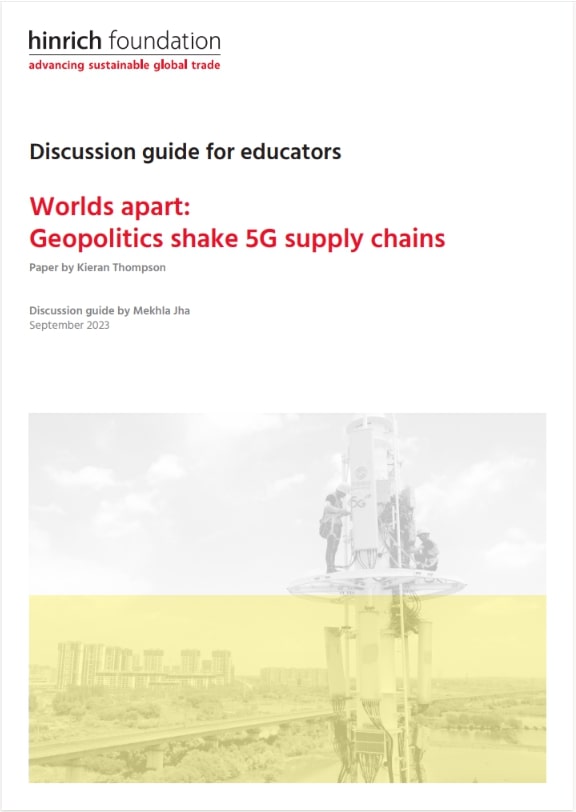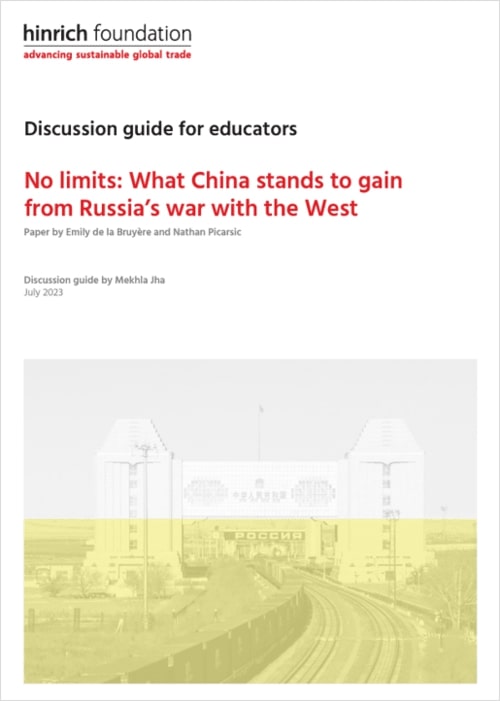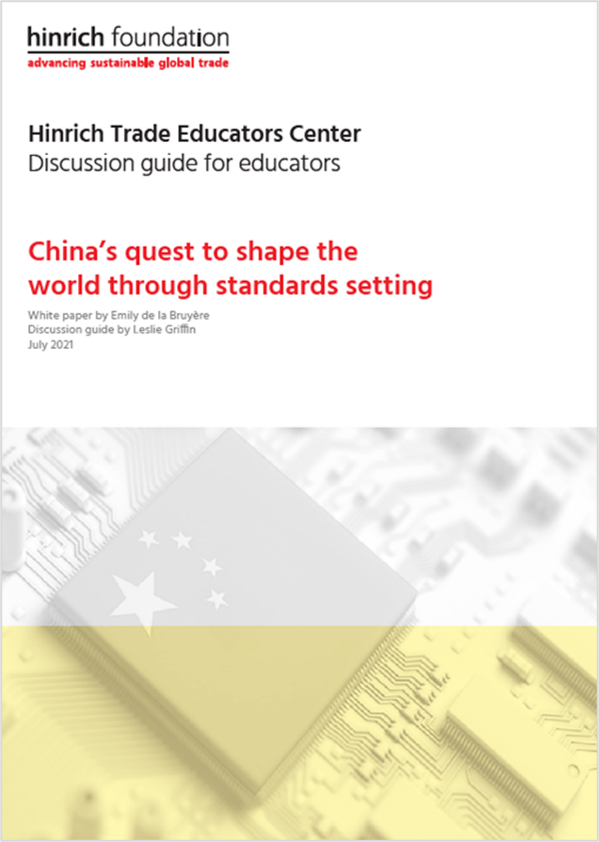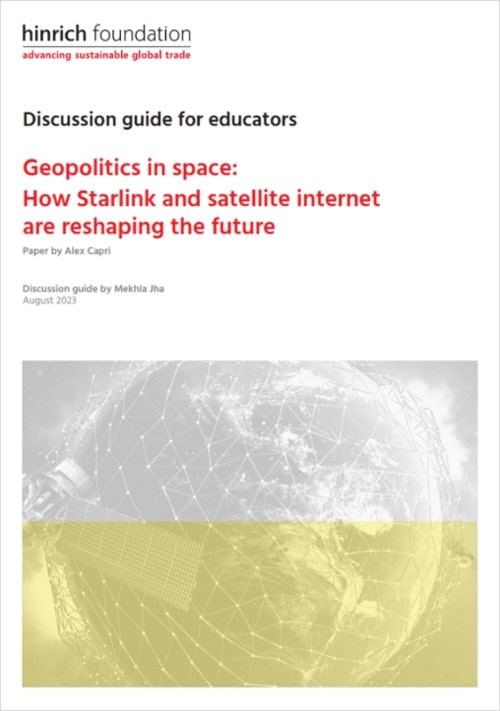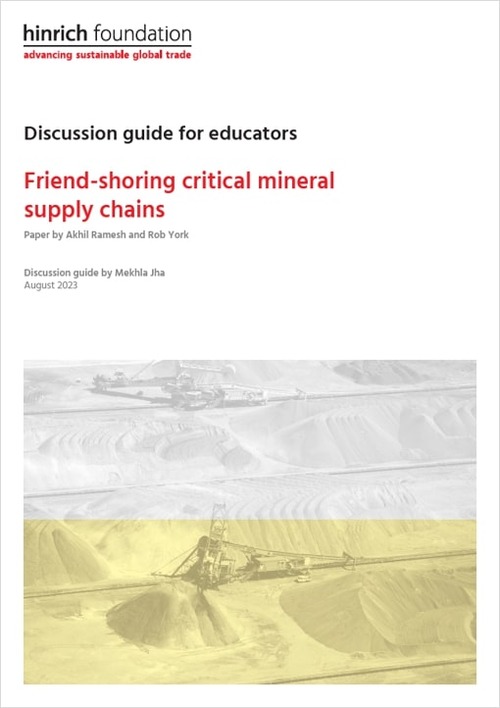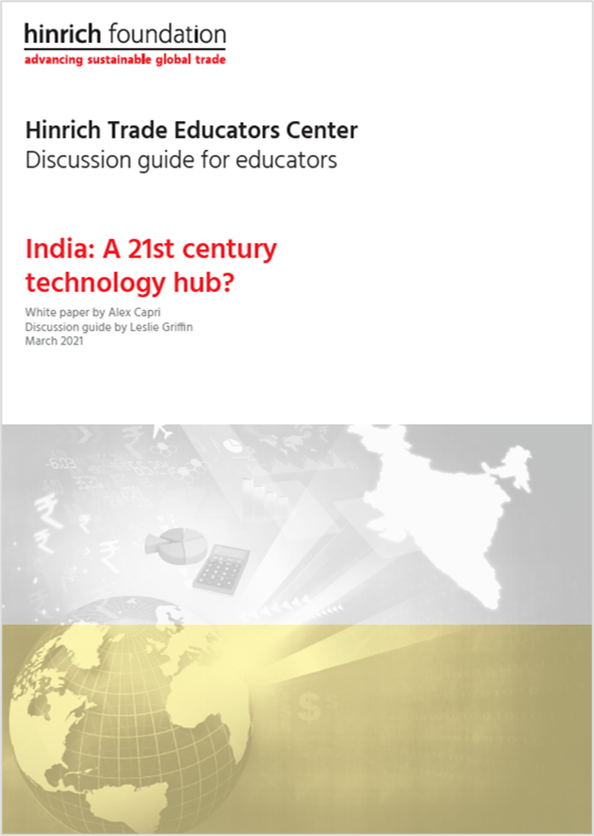Discussion guides
Discussion guides highlight key points of our trade research to facilitate understanding, prompt analytical evaluation and encourage action. We designed them with academics and students in mind, but business and public sector leaders also find them useful.
Our discussion guides aim to help you bring contemporary trade issues into focus, whether it is for the teaching, learning, implementing or developing global trade.
Based on the research published by our global roster of research fellows, contributors and partner organizations, the discussion guides are designed to help readers quickly understand the economic, social, and geopolitical dynamics driving global trade and pose questions to encourage analytical evaluation.
Topics range from sustainable trade and US-China trade to digital trade and WTO. View our latest release. The content is available for reprint and use through our reprint policy.
Our latest discussion guide
Data centers and undersea cables tangle in geopolitics and climate
The modern internet is often imagined as a disembodied medium. The ‘cloud’ is, in reality, created by stacks upon stacks of servers in hot, dark warehouses. While in the past it had been easy to overlook the role data centers, power lines, and subsea cables play in enabling the modern economy, the advent of artificial intelligence, the exponential growth in the creation of data, and the growing strategic value of data mean it is no longer tenable to ignore the physicality of the virtual world.
 Investments among Big Tech companies on these infrastructures are projected to continue to rise, but tech providers are already running into energy and geopolitical challenges. In the Asia-Pacific, subsea cables cannot be laid along cost-effective routes due to the international contest over the South China Sea. Countries worldwide are competing to crowd into the physical location of data centers, putting land-scarce economies at risk. The enormous demand for energy from these data centers is driving Big Tech to unconventional strategies, such as nuclear power, raising yet another set of environmental risks. If these issues are not addressed, the rapid advancement of the digital economy will be slowed, with consequences for the evenness and equality of global economic development.
Investments among Big Tech companies on these infrastructures are projected to continue to rise, but tech providers are already running into energy and geopolitical challenges. In the Asia-Pacific, subsea cables cannot be laid along cost-effective routes due to the international contest over the South China Sea. Countries worldwide are competing to crowd into the physical location of data centers, putting land-scarce economies at risk. The enormous demand for energy from these data centers is driving Big Tech to unconventional strategies, such as nuclear power, raising yet another set of environmental risks. If these issues are not addressed, the rapid advancement of the digital economy will be slowed, with consequences for the evenness and equality of global economic development.
The costs of export restrictions to the global economy
In recent years, particularly since 2020, there has been a significant increase in various forms of export restrictions. These measures range from outright bans on certain exports to the enforcement of export taxes or quotas. While between 2015 and 2019, the average annual number of export restrictions by World Trade Organization members stood at just under 24, since 2020, this figure has surged to an average of 77.6 per year. Despite their diverse implementation, including outright bans, export taxes, and quotas, the effectiveness of these restrictions remains questionable, with the potential to spur innovation from new market players over time, leading to the development of alternative and often superior products.
In the short term, export restrictions exacerbate supply shortages, posing risks to geopolitical and macroeconomic stability and even human lives. The COVID-19 pandemic highlighted this issue, with export restrictions severely limiting access to crucial medical supplies for patients in developing nations. Similarly, the conflict in Ukraine has induced panic, disrupting trade in essential commodities like food and fertilizers as governments prioritize domestic needs. In this paper Keith M. Rockwell sheds light on the concerning trend of governments increasingly implementing export restrictions, a practice posing significant challenges to global trade. Rockwell emphasizes that the consequences of export restrictions extend beyond supply chain disruptions and strained commercial relations, highlighting the urgent need for solutions to mitigate their adverse effects on global trade and stability.
Leveraging technology to develop Asia's answer to Verra
The development of robust global carbon markets is a crucial tool in the fight against climate change. As the market emerges from a niche industry into mainstream awareness, many problems with its structure are coming under scrutiny. Asia, where the majority of carbon credit project work is based, still lacks native carbon registries to regulate emission cuts. Verra, the world’s largest carbon registry, is grappling with a scandal after journalists reported that most of its issued forestry carbon credits were fraudulent or non-existent.
In this paper, Max Song of Carbonbase examines how the adoption of emerging technologies, such as Internet-of-Things, big data collection, AI, and distributed ledger technology, can enhance the credibility and tracking of carbon credit projects. By unlocking the full potential of a carbon credit economy through the creation of APAC digital native carbon registries, we can create a new generation of advanced infrastructure to channel investment into much needed climate action.
China's thirsty chips
For nearly a decade, China has worked to ramp up the domestic production of semiconductors. This supports the goal that President Xi Jinping has set to establish China as a leading power in global science and technology by 2049, the 100th anniversary of the country’s founding. But the country’s ambition could be curbed by a major, often overlooked, constraint – water, or, rather, the lack of it.
In this article, Elizabeth Wishnick, Senior Research Scientist in the China Studies Division at the Center for Naval Analyses, provides an assessment of China’s water challenge and surveys the impact of industrialization on essential resources, which is among the factors gauged by the Hinrich-IMD Sustainable Trade Index. The index measures the relative capacity of 30 key economies to achieve sustainable growth through global trade.
Understanding the Sustainable Trade Index 2023
In today’s dynamic economic and geopolitical landscape, we’re witnessing a shift from an era of rapid globalization to one of trade fragmentation and rising protectionism. How will this age of fragmentation transform global trade and economic policy as well as sustainability practices? The Hinrich-IMD Sustainable Trade Index (STI) 2023 assesses these factors.
The STI measures the capacity of 30 diverse economies to align global trade policies with long-term objectives for economic growth, societal development, and environmental protection. This fifth iteration of the index uses 71 indicators grouped into three core pillars. New Zealand and the United Kingdom maintain their top two positions in the overall ranking, as with the 2022 results. Singapore advanced two positions from last year into third place.
Freeze and seize: Implications of asset confiscations for Russia, China, and the world
The last 40 years of globalization have created large webs of cross border trade, investment, and overseas asset accumulation. This has made foreign-owned property a target of restrictive measures in wars, international disputes, and geopolitical crises. During this period the main asset freezer has been the United States, whose dollar based financial system holds the reserve assets of many central banks and private individuals around the world.
This report by Nicholas Mulder examines the historical precedents of asset freezing, surveys the campaign against Russian private assets around the world so far, and maps the implications for Asian economies whose public and private overseas asset holdings are among the largest in the world.
Challenging trade dependency on China
While headlines have tended to focus on the strains in the US-China relationship, other countries were coming to the conclusion at about the same time that economic ties with China had geopolitical and security ramifications in addition to economic ones.
In this third installment of a Hinrich Foundation series on trade dependency, Research Fellow Stewart Paterson examines some of the constraints that Western governments face in formulating policies designed to reduce economic dependency on China amid shifting public attitudes towards the country. Paterson also surveys some of the unilateral and multilateral measures taken so far, and caution that their impact remains unclear as a structural slowdown in China’s economy and the government’s policies obscure both the underlying causes and degree of economic decoupling.
Sustainable Trade Index 2022
Global trade has helped lift hundreds of millions of people around the world out of poverty, but the benefits of trade do not come without their risks. If an economy is unprepared for the consequences of trade growth, it may result in labor disruption, environmental degradation, and worsening inequality. Proactive and responsible government policy and farsighted corporate decision-making can harness the benefits of trade and mitigate its excesses.
The Sustainable Trade Index (STI) 2022 was developed jointly by the Hinrich Foundation and the IMD World Competitiveness Center as a framework for policy makers, business executives, and civil society leaders to understand and advance sustainable global trade. The STI measures how effectively 30 major trading economies are geared for long-term economic growth, environmental protection, and societal development across 70 indicators. The 2022 index saw New Zealand reach the top position in the overall ranking by performing robustly across all pillars.
Eyes on the prize: The race to hone visibility on supply chains
Traceability of goods in regional and global supply chains has a purpose beyond assuaging shoppers that their orders are on the way. It also enables retailers to forecast lead times and manage stocks and allows brands to highlight ethical sourcing practices to their customers. With traceability, governments can identify sources of foodborne illnesses and traders can confirm that their goods qualify for preferential treatment at customs. In short, traceability strengthens productivity, reduce costs, and support green supply chains.
In this paper, Research Fellow Kati Suominen examines the key issues that foster traceability and encourage its adoption across the economy. The brief discusses the many factors driving businesses to improve traceability; technologies and business models that are enabling traceability of goods in regional and global supply chains; the pending business and policy challenges to end-to-end traceability in supply chains; and emerging solutions to these challenges.
Top priority for Indonesian leadership of G20 cooperation
In just over two months, the world food situation has gone from bad to worse as supply chains continue to malfunction. Many countries have panicked in the face of shortages by imposing export bans on various critical agricultural products. It will not be easy to stop this crisis, much less return to more normal trade patterns. Coordination among the world’s leading economies will be needed to make progress.
In this article, C. Peter Timmer of Harvard University suggests that a moment for such coordination is on the horizon – the forthcoming G20 summit meeting in Bali in November 2022. With Indonesia in the chair, there is an opportunity for that country and for ASEAN, as a major regional trade organization, to get a formal commitment from G20 members to focus on food security and roll back trade restrictions. This essay is part of the Hinrich Foundation sponsored Vol.14 No.2 issue of the East Asia Forum Quarterly.
The geopolitics of climate change and cleantech
The quest to decarbonize the global economy by 2050 has led to a sizable shift in investment toward “cleantech”. But the road to a carbon-neutral world must pass through a quagmire of economic nationalism, inward-looking domestic politics, and a new kind of climate-driven realpolitik. Despite the likely astronomical consequences of climate change, geopolitics will continue to influence the behavior of state and non-state actors.
As such, cleantech assets represent yet another manifestation of 21st century techno-nationalism: a neo-mercantilist mindset that links the technological capabilities of a state’s key actors and institutions to its national security and economic strength, and socio-political stability. This paper by Research Fellow Alex Capri outlines the impact of climate realpolitik in three key areas: infrastructure geopolitics, carbon-related market dynamics, and rule frameworks.
Yellen, Lagarde, and the death of the global trade system
The need for common values and geostrategic compatibility will now increasingly shape trade and investment flows. As Janet Yellen and Christine Lagarde – both committed multilateralists – have recognized recently in their respective remarks at two public forums, the postwar era of globalization irrespective of any potential security or philosophical divergences is approaching an end. Trade should be increasingly conducted within a much more narrowly defined basket of “friends” who share common “values”.
The extent to which this vision is already being implemented across democratic countries should serve as a wake-up call to businesses, argues Senior Research Fellow Stephen Olson in this article. Companies can no longer afford to detach themselves from the many global trade policy debates and national geostrategic calculations.
Wind and wires: Can Europe stay ahead in green and 5G technologies?
Europe’s tech capabilities and global competitiveness are often overlooked in policy debates on the global tech race. The EU is commonly portrayed by international media as lagging behind the United States and China. In some technologies, this depiction of competitive weaknesses is warranted. Yet in fields such as renewable energy and fifth-generation mobile networks, the EU is leading the race.
By unpacking European tech capabilities and competitiveness in wind and telecom technologies, this paper by Luke Patey of the Danish Institute for International Studies examines the market positioning of these firms to highlight European leadership in critical and emerging technologies. While this paper also points out the challenges Europe faces from rising competition, it diverges from analysis focusing on the bloc’s tech deficiencies. Instead, the author places a spotlight on what the EU can do to make up lost ground and maintain the leading-edge it has already achieved.
Will war in Ukraine unseat US dollar leadership in global trade?
The damage of sanctions inflicted on Russia highlights the vulnerabilities of countries dependent on the global financial infrastructure led by Western nations. As the world’s largest trading economy, some have argued that China’s renminbi is well placed to bring an end to the dollar standard. This article by Research Fellow Stewart Paterson points to three observations that suggest this line of reasoning maybe be overblown or premature.
First, as China aims for its currency to become a greater part of the global system, capitalizing on the opportunity presented by the sanctioning of Russia may well end up severely limiting the broader adoption of the RMB. Also, in light of China's reliance on the global economic system for its continued prosperity, Beijing is unlikely to jeopardize this by facilitating large-scale sanctions busting.
If indeed China’s financial system provides a work-around for Russia, potential secondary sanctions and countermeasures could threaten a complete breakdown of multinational business models.
Counting carbon: The implications of border carbon adjustments on developing countries
Border carbon adjustment (BCA), once an obscure policy understood by few, is now front and center in the ongoing global conversation on carbon pricing, trade, and climate policy. At a conceptual level, BCA accompanies domestic carbon pricing and imposes charges on imports. Of the different approaches across jurisdictions, the European Union’s Carbon Border Adjustment Mechanism (CBAM) is the most advanced.
One of the fundamental controversies with respect to BCA is the incidence of burden. Some studies have shown that the main burden in a BCA scenario falls on developing country exporters, who would lose market share in implementing market countries. In anticipating CBAM and subsequent similar initiatives, author Aaron Cosbey of the International Institute for Sustainable Development (IISD) explores the strategic options that developing economies can pursue to prepare for future challenges and opportunities.
The WTO, trade agreements, and sustainable trade: The Asian experience
The evolution of the global trading system over the past half century has significantly changed the relationship between trade and sustainable development. The principal link comes from trade liberalization, which promotes growth and provides additional resources to advance sustainable development. Nowhere has this played a larger role than in Asia’s economic transformation and the subsequent rise of millions out of poverty.
In this essay, Gary Sampson of Melbourne University highlights the potential central role of the World Trade Organization (WTO) in achieving the sustainable development goals. The WTO has been greatly weakened in past years. However, as major beneficiaries and active participants in trade agreements, Asian countries are well-placed to take a leading position in the reform of the global trading system.
Mercantilist reciprocity or free trade: Globalization at a crossroads
The case for free trade has always been a tough sell. The benefits of trade come from imports, which deliver more competition, greater variety, lower prices, better quality, and innovation. But when it comes to trading across borders or when our individual transactions are aggregated at the national level, we seem to forget these basic principles. We assume that the goal of exchange is to achieve a trade surplus. Our modern global trading system was built on this shaky foundation of 'mercantilist reciprocity'.
In this essay, author Daniel Ikenson of ndp | analytics notes that this approach has reinforced a flawed way of thinking about trade that helps explain the rise of protectionism and the ease with which some governments flout their commitments to the trade rules in favor of unilateralism. He remarks that trade barriers are not assets to deploy at the negotiating table, but impediments to domestic businesses, workers, and consumers.
Advancing sustainable development with FDI: Why policy must be reset
In many countries, foreign direct investment (FDI) outperforms aid, remittances, and portfolio investments as the largest source of external financing. Properly guided, FDI creates jobs, boosts productivity, and brings management expertise and technology. Subsequently, industries modernize, domestic supply chains emerge, infrastructure develops and improves, as do regulatory reforms and living standards.
Since the 2008 Global Financial Crisis, however, FDI has suffered a steady decline, both in aggregate and in developing countries. Over the past five years in particular, public policy has created headwinds for foreign investments. Discussions on the contribution of international business to pressing global challenges urgently need a reset.
This report, authored by Simon J. Evenett and Johannes Fritz of the Global Trade Alert, was published by the Centre for Economic Policy Research. In supporting this research, the Hinrich Foundation retains optimism in FDI’s contribution to advancing economic growth and sustainable development, and encourages action to address the regulatory gaps that hold back investment.
Hinrich Foundation Sustainable Trade Index 2020
The Sustainable Trade Index measures the capacity of 20 economies – including 19 in Asia, and the United States – to participate in international trade in a manner that supports the long-term domestic and global goals of economic growth, environmental protection, and better social equity.
Commissioned to the Economist Intelligence Unit (EIU), the 2020 index examines the role of sustainable trade for building back better in a post-COVID-19 world. It identifies four areas policymakers, business leaders and NGOs should address for more sustainable growth.
This report comes with a dataset that contains detailed results for the 20 economies reviewed, and can be compared across economies, indicators and years.
The Sustainable Trade Index is currently in its third edition.
China’s unemployment conundrum and its implications for global trade
China’s official unemployment rate in urban areas has remained flat at around 5% for decades, but it has never reflected the reality on the ground. Since the end of its draconian Covid-19 restrictions, China’s economy has been struggling to rebound amid weak domestic demand, excess savings, debt crises, and falling property prices and investments. The country has turned to doubling down on exports to boost its economy, but its foreign trade is facing significant headwinds due to supply chain disruptions, the US-China decoupling process, and high tariffs levied by major trading partners including the United States and European Union.
Ultimately, China’s job market struggles are deeply embedded in a state capitalism system driven by mercantile national strategies that aim at export expansion and trade surpluses. Without significant reform, the pressures from prolonged economic stagnation, loss of trade competitiveness, and social discontent cannot stay contained much longer, writes Chen Gang, deputy director of the National University of Singapore’s East Asian Institute.
Is China’s overseas direct investment outflanking US trade strategy?
Superficially, the US appears to be diversifying its sources of imports away from China. But America’s trade dependency on the world’s factory have not been reduced as drastically as headlines suggest. To date, third-country success in accessing the US market to replace Chinese exports has been strongly associated with an increase in investment from China, according to an analysis of fDi Markets data by Senior Research Fellow Stewart Paterson.
If one of the objectives of US economic statecraft is to immunize the country from potential economic coercion by China, then it is still work in progress. But the seeds have been sown for a greater degree of genuine diversification of supply. In the same way that foreign multinational enterprises were at the forefront of building economic scale and expertise in China in the 1980s and 90s, the inflow of Chinese money into third countries will lead to new or growing manufacturing hubs and foster vertical integration abroad. This could ultimately lead to a more even distribution of manufacturing throughout the world, thus making trade more sustainable.
China’s guerrilla strategy in a fragmenting global economy
After decades of reform and opening, China’s massive industrial capacities and trade footprint enable its leadership to pursue global ambitions. Faced with perceived containment, Beijing is resorting to guerrilla strategies to reconcile its security-centered goals and internal doctrine of a Marxist-Leninist economic system while aiming for greater global influence. These strategies allow China to avoid direct confrontation with large adversaries by targeting smaller sections of their resources to gradually deplete the larger opponent.
From the perspective of the Chinese leadership, the hollowing out of the US industrial base presented an opportunity to strengthen its standing. Since the 1990s, US-led economic liberalization and Group of Seven-centered global integration catalyzed the development of intricate supply chain networks. The next phase of geopolitical globalization will be shaped by great power competition and the evolution of China’s political economy and external economic engagement, Max Zenglein and François Chimits of MERICS write.
The world’s factory strikes back
Governments in major economies have rolled out new policies to reduce their high dependency on China for strategic goods. While the resulting changes are poised to challenge China’s status as "the world’s factory", the country is not sitting idly by and is itself trying to expand and deepen its position in the global geoeconomic architecture. For Beijing, industrial upgrading is not only about technological leadership and reducing dependence on foreign input but also about modernizing traditional manufacturing.
Due to its industrial capabilities, cost efficiency, and comprehensive supply chain infrastructure, China will continue to shape this period of re-globalization characterized by systemic competition. Beijing will make the process as costly as possible for its rivals as the country competes with both emerging and developed economies. How the country leverages its manufacturing power will matter tremendously for any diversification efforts and the global economy, writes Max J. Zenglein of MERICS.
Did too much faith in free markets undo globalization?
Globalization of the late 20th and early 21st century was facilitated by a convergence of policy consensus on the benefits of neoliberalism, where economic welfare is maximized through the efficient use of scarce resources. The sustainability and equity of such an undertaking depend over the longer term on all significant participants adopting the same approach, but not all did. Furthermore, the World Trade Organization, the governing body of the global trading system, hasn't been able to enforce deep economic regulatory alignment behind national borders.
As states that eschew market forces rise to prominence, such as China, many of the theoretical mechanisms that should have ensured the delivery of net benefits under the market system have broken down. In response, erstwhile proponents of a laissez-faire approach to trade are now adopting more mercantilist policies all over the world. Amid this change, Research Fellow Stewart Paterson sets out to answer some key questions in this paper: How has the rise of China challenged the major tenets and theoretical underpinnings of orthodox trade theory? Does the migration to a multipolar world and the resumption of great power rivalry inevitably entail a move toward a more mercantilist approach to global trade? Is there a better way for the West to respond?
Will war in Ukraine unseat US dollar leadership in global trade?
The damage of sanctions inflicted on Russia highlights the vulnerabilities of countries dependent on the global financial infrastructure led by Western nations. As the world’s largest trading economy, some have argued that China’s renminbi is well placed to bring an end to the dollar standard. This article by Research Fellow Stewart Paterson points to three observations that suggest this line of reasoning maybe be overblown or premature.
First, as China aims for its currency to become a greater part of the global system, capitalizing on the opportunity presented by the sanctioning of Russia may well end up severely limiting the broader adoption of the RMB. Also, in light of China's reliance on the global economic system for its continued prosperity, Beijing is unlikely to jeopardize this by facilitating large-scale sanctions busting.
If indeed China’s financial system provides a work-around for Russia, potential secondary sanctions and countermeasures could threaten a complete breakdown of multinational business models.
Building a Wall Street for data – China’s data centers reflect grand ambitions
Projected to begin operations in 2025, China’s Data Free Trade Port in Nansha is a breakthrough project. By integrating a network of largescale data and computing centers, the Port advances a key task of the Ministry of Industry and Information Technology for the 14th Five Year Plan period. The Port fits into Beijing’s larger strategy to attain global leadership by controlling data, categorized by the Chinese Communist Party as the catalyst for a new industrial revolution.
In this paper by Emily de la Bruyère of the Foundation for Defense of Democracies, the author notes that Beijing's ambition to build an digital economic architecture to control the storage, flow, and use of data increasingly extends globally. From an international perspective, China’s approach could turn the Port into a center of gravity for digital transactions, similar to US centrality to financial transactions. Until a robust alternative to China’s vision emerges, Beijing will continue to have a shot.
Three problems with the US Indo-Pacific Strategy
In February 2022, the US unveiled its much-anticipated Indo-Pacific Strategy paper. The 19-page document asserts the Biden administration’s determination “to strengthen [the US] long-term position in and commitment to the Indo-Pacific” and lays out – at least in broad terms – how it intends to accomplish this goal. Hinrich Foundation Senior Research Fellow Stephen Olson identifies that there are three problems with the strategy: 1) The US views China as a challenge that needs to be confronted, but for others, it’s complicated; 2) Large portions of the US agenda are unlikely to be embraced; 3) The US has less to offer the region.
Given China’s entrenched position, the Biden administration is left with only a limited number of moves. But time could be on its side, as Beijing's global standing becomes more vulnerable, particularly since Russia's invasion of Ukraine. Olson concludes in this article that strategic patience lacks panache, but over the long run, it could be the most effective course for the US.
Power in a small package: Taiwan and the global semiconductor supply chain
Without significant promotional spending, Taiwan Semiconductor Manufacturing Corporation (TSMC) has gained global renown as the cutting edge of innovation. Its success story has a geopolitical dimension. China’s reliance on Taiwanese semiconductors offers the island a buffer against Beijing’s increasingly truculent policies – at least for now. These trade links are becoming strained as US-China technonationalist imperatives put Taiwan’s place in the global technology ecosystem under unprecedented public pressure.
In this paper, Jeremy Mark of the Atlantic Council notes that Taiwan faces three key challenges: adapting a successful business model in a time of rapid change; using semiconductors to strengthen Taiwan’s place in the world; and realigning US-Taiwan interests as supply chains transform. Mark concludes that to avoid further damage to a critical industry, the US approach must carefully manage disruptions and minimize policy shocks.
Trade and tax in a digital world
The digital economy has affected traditional tax systems in at least three important ways: by allowing firms to compete in markets without a physical presence; by the proliferation of approaches, mostly used by large firms, to more carefully manage tax; and by the participation in cross-border trade by companies previously not engaged in such transactions.
Changes in tax policy to address these challenges run a significant risk of upending cross-border trade opportunities and burdening firms of all sizes with substantial new compliance costs. As tax and trade have been considered largely in silos, unintended consequences are likely to rise.
This paper, the third in our Asian Digital Economy Series by Deborah Elms, Founder and Executive Director of the Asian Trade Centre, outlines the tax regulatory fragmentation currently weighing down the promise of the digital economy and its impact on firms across the region.
How will China’s Dual Circulation Strategy impact the global economy?
Announced in May 2020, China’s Dual Circulation Strategy (DCS) gives formal substance to several established trends and policies that are now being pursued by the Chinese Communist Party (CCP) with renewed vigor. This begs the question: how will DCS change the way China’s economy engages with the rest of the world? Is China likely to succeed? Furthermore, how will this approach impact the multilateral trading system and the global economy more generally?
This second report of the DCS series by Research Fellow Stewart Paterson is divided into three parts. Part one examines the evolution of linkages between China and the global economy, and assesses how recent policy moves may be changing the extent and nature of this engagement. Part two explores how these dynamics might shift going forward. Finally, part three explores some of the macroeconomic implications of DCS under various scenarios.
Quantum computing: A new frontier in techno-nationalism
The age of modern computing has produced remarkable innovations across entire industries, a phenomenon that has been driven largely by semiconductors. As microchips can no longer accommodate increased numbers of transistors (known as “bits”) on surface areas that have shrunk to the size of an atom, quantum computing promises to provide the answer.
This paper by Hinrich Foundation Research Fellow Alex Capri studies the latest general developments of quantum computing, and how it could transform the future of geopolitics and global trade. Quantum computing could reshape innovation and competition in virtually every field, produce decisive advantages in a state’s technological prowess, and decide winners and losers across a wide range of strategic industries. State and non-state actors must begin to understand and successfully harness the power of the “qubit” – or risk being dominated by those who do.
Techno-nationalism via semiconductors: Can chip manufacturing return to America?
The COVID-19 pandemic and ongoing US-China geopolitical tensions have converged to create a global shortage of semiconductors. The increased attention on semiconductor global value chains brought stark realities to light. First, microchip manufacturing is disproportionately concentrated in Asia, especially in Taiwan. Single-source supply chains are fragile and highly vulnerable. Second, China’s increasingly competitive relationship with the US and its allies is accelerating strategic decoupling, reshoring, and ringfencing throughout the semiconductor landscape.
As geopolitical rivalry intensifies, the US and China share one common goal: They both want to localize semiconductor manufacturing. In this paper, Hinrich Foundation Research Fellow Alex Capri focuses on the actions the United States has taken to try and revitalize its chip industry. This report is Part 2 of the comprehensive primer Semiconductors at the heart of the US-China tech war.
A techno-globalist approach to intellectual property and supply chain disruptions
This paper is co-authored by Mark A. Cohen, Distinguished Senior Fellow and Director at the Berkeley Center for Law and Technology, and Philip C. Rogers, PhD candidate at the University of California, Berkeley.
The authors note that responding to techno-nationalism need not be a binary choice between decoupling and engagement with China. Global IP-protective strategies can also help remedy the IP theft concerns underlying US-China trade tensions. In what the authors termed a "techno-globalist alternative", more practical approaches that incorporate IP strategies can help build stable, durable and resilient supply chains.
New Cold War: De-risking US-China conflict
This paper authored by Hinrich Foundation Senior Research Fellow Dr. Alan Dupont, one of Australia's leading security strategists and Asianists, concludes that the linked US-China trade, technology and geopolitical conflicts have precipitated a new Cold War. A second Cold War could be worse than the first, given the interdependence of the US and Chinese economies, their centrality to global prosperity and the proliferation of dangerous military and digital technologies.
This report draws out the risks — and likely consequences — for a system already in a state of flux as the transition to a post-American world accelerates and the coronavirus wreaks havoc on the world economy and international trade. Comprised of four chapters, it concludes by outlining seven recommendations for policy makers to prevent and mitigate worst-case outcomes of the increasingly bitter contest between China and the US.
Techno-nationalism and the US-China innovation race
This report was published on 3 August 2020 by the Hinrich Foundation, and authored by Research Fellow Alex Capri. This paper outlines the implications for markets, academia, research organizations, and governments of the US-China competition to achieve innovation advantage.
A US-China tech innovation race has sparked a paradigm shift in global trade and commerce that is challenging the long-standing primacy of the world's open trading system.
Current thinking is tilting towards increased state activism and interventionism, not only in the technology landscape but in many of the industries of the future.
Driving this change is techno-nationalism: a mercantilist-like behavior that links tech innovation and enterprise directly to the national security, economic prosperity and social stability of a nation.
Say hello to industrial policy, but never goodbye
Once policymakers go down the rabbit hole of industrial policy, they often find it difficult to claw their way out again. While there are compelling reasons for the US administration to shift towards an industrial strategy, such policies in America have often brought more harm than good, as companies that have drawn deeply from the public trough rarely volunteer to surrender this patronage.
As the Biden administration takes the United States into the most state-centric set of economic policies since those of Franklin Roosevelt, Senior Research Fellow Keith Rockwell examines in this paper the case behind America's policy change and what lessons can be learned from the past. It is worth remembering, Rockwell warns, that while market forces are not the be all and end all, neither are governments.
Subsidies and market access: towards an inventory of corporate subsidies by China, the EU, and the US
The number of subsidy-related trade disputes has increased sharply since 2010. Yet, at present there is no work program at the World Trade Organization for trade-related aspects of subsidies and no serious attempts to find common ground. Governments face a conundrum. Do they retain subsidies although they can erode market access won in trade agreements?
Recriminations have been exacerbated by a lack of comparable and reliable information on subsidy schemes and awards. In this report, Simon Evenett and Johannes Fritz of the Global Trade Alert assembled an inventory of 18,137 corporate subsidies awarded by China, the EU, and the US since November 2008 to assess the scale of national and cross-border commerce affected. This paper urges for renewed cooperation to reverse the deficit of trust caused by subsidies and thus safeguard the future of trade.
Can 'middle powers' reset global trade through the CPTPP?
Today, the global balance of power revolves around three economic superpowers: the United States, the European Union, and China. Yet the relative autarky and increasing protectionism of the three superpowers, together with the cumbersome nature of the World Trade Organization, have arguably hindered progress when it comes to bringing trade arrangements up to date and making them fit for purpose in a rapidly changing world.
In this paper, Hinrich Foundation Research Fellow Stewart Paterson argues that Brexit may be reconfiguring more than just Europe. The UK’s application to join the Comprehensive and Progressive Agreement for Trans-Pacific Partnership (CPTPP) could signal the emerging role of ‘middle powers’ in reviving free trade and multilateralism. Pending on the outcome of China’s application for membership, the agreement would have enabled countries committed to free trade to forge ahead with deeper economic engagement, thereby rejuvenating the global trading system.
The greater good: Eight challenges to the global e-commerce boom
E-commerce has witnessed remarkable growth in the Asia-Pacific region and globally, providing significant opportunities for small and medium enterprises (SMEs) to expand their market reach and diversify their exports. This surge in e-commerce has not only led to financial benefits but has also fostered greater inclusivity in the workforce, particularly among non-traditional societal groups including women, while leveling the playing field for those who are financially less-advantaged.
However, sustaining this growth and reaping the associated socioeconomic benefits requires careful attention. Governments are increasingly considering new taxes on online sales, and the proliferation of data localization practices poses risks to SMEs' ability to protect the data of their foreign customers and enhance their services. Moreover, the fragmented global digital trade policy landscape, compounded by geopolitical tensions, is resulting in escalating trade costs and the emergence of sustainability regulations, adding to existing challenges such as manual paperwork and connectivity issues. Despite the negotiations aimed at establishing a global framework of trade rules for e-commerce at the World Trade Organization, recent setbacks, such as the withdrawal of support from key aspects by the US, have sparked concern among business coalitions and US Congressional leaders. Research Fellow Kati Suominen evaluates these risks and offers recommendations for reforming government policies to address them effectively.
Challenges to the global convergence on digital standards
Standards developed during the past two centuries have enabled the global exchange of goods, people, and information. However, standardization remains slow in one key area of international trade: the digitization of documents.
In this paper, Kati Suominen highlights the imperative of digitizing trade documentation and improving its interoperability for cutting costs, advancing consumer welfare, and lowering barriers to market entry. Supported by scores of case studies, the brief begins with an overview of the pain points in traditional paper-based trade before moving on to discuss the benefits of standardizing and digitizing trade paperwork. The author also examines the state of play on standards and their adoption in various jurisdictions, as well as the challenges and opportunities policymakers face.
Will Europe’s new economy be made in China?
Europe is becoming a focal point in the struggle for the commanding heights of the global sustainable economy supply chain. The continent’s size, climate policy, trade openness, and single-minded efforts to wean itself off Russian energy have made it a natural prime target of China’s push for renewable energy export. China’s campaign is driven by flagging demand at home and a strategic imperative to break growing efforts by the US to isolate the Asian giant.
In this paper, Storey examines how China’s price competitiveness drove its renewables to be quickly absorbed by Europe, evaluates Europe’s dilemma in the face of competing interests, and studies how Chinese companies are diversifying to new markets along the Belt and Road Initiative.
Digital trade provisions play a key role in the Asia-Pacific
Using the Comprehensive and Progressive Agreement for Trans-Pacific Partnership (CPTPP) as a baseline, digital trade provisions in the Asia Pacific can be grouped into four categories: 1) Provisions that intend to open and align the regulatory environment; 2) Provisions that minimize commercial and regulatory burdens for digital services trade providers; 3) Provisions that protect the interests of consumers; and 4) Provisions that preserve the regulatory autonomy of governments.
In this article, Henry Gao of the Singapore Management University points out that in order to foster their digital sector, developing countries in the region will need to enhance the provisions in the second and third categories. In addition, the emergence of standalone agreements such as the Singapore-Australia Digital Economy Agreement (SADEA) and the Digital Economy Partnership Agreement (DEPA) raises fundamental and conflicting questions on whether the existing multilateral trade agreement structure and process is fit-for purpose in the digital era.
Eyes on the prize: The race to hone visibility on supply chains
Traceability of goods in regional and global supply chains has a purpose beyond assuaging shoppers that their orders are on the way. It also enables retailers to forecast lead times and manage stocks and allows brands to highlight ethical sourcing practices to their customers. With traceability, governments can identify sources of foodborne illnesses and traders can confirm that their goods qualify for preferential treatment at customs. In short, traceability strengthens productivity, reduce costs, and support green supply chains.
In this paper, Research Fellow Kati Suominen examines the key issues that foster traceability and encourage its adoption across the economy. The brief discusses the many factors driving businesses to improve traceability; technologies and business models that are enabling traceability of goods in regional and global supply chains; the pending business and policy challenges to end-to-end traceability in supply chains; and emerging solutions to these challenges.
Building a Wall Street for data – China’s data centers reflect grand ambitions
Projected to begin operations in 2025, China’s Data Free Trade Port in Nansha is a breakthrough project. By integrating a network of largescale data and computing centers, the Port advances a key task of the Ministry of Industry and Information Technology for the 14th Five Year Plan period. The Port fits into Beijing’s larger strategy to attain global leadership by controlling data, categorized by the Chinese Communist Party as the catalyst for a new industrial revolution.
In this paper by Emily de la Bruyère of the Foundation for Defense of Democracies, the author notes that Beijing's ambition to build an digital economic architecture to control the storage, flow, and use of data increasingly extends globally. From an international perspective, China’s approach could turn the Port into a center of gravity for digital transactions, similar to US centrality to financial transactions. Until a robust alternative to China’s vision emerges, Beijing will continue to have a shot.
Data sovereignty and trade agreements: Three digital kingdoms
Paradoxically, sovereignty is one of the most important as well as most misunderstood terms in international law. This is especially true in the areas of international law such as international trade law, where sovereignty and international obligations are often pitted against each other when countries try to enforce binding legal obligations through compulsory dispute settlement systems.
In this paper, Henry Gao of Singapore Management University surveys an emerging area where sovereignty continues to pose challenges to international trade law: data regulation in trade agreements, which best illustrates the conflict between international trade regulation and sovereignty in the digital era. Upon empirically examining the three leading divergent approaches to data sovereignty in trade agreements, Gao concludes with observations on possible future convergence of those three models.
Trade and tax in a digital world
The digital economy has affected traditional tax systems in at least three important ways: by allowing firms to compete in markets without a physical presence; by the proliferation of approaches, mostly used by large firms, to more carefully manage tax; and by the participation in cross-border trade by companies previously not engaged in such transactions.
Changes in tax policy to address these challenges run a significant risk of upending cross-border trade opportunities and burdening firms of all sizes with substantial new compliance costs. As tax and trade have been considered largely in silos, unintended consequences are likely to rise.
This paper, the third in our Asian Digital Economy Series by Deborah Elms, Founder and Executive Director of the Asian Trade Centre, outlines the tax regulatory fragmentation currently weighing down the promise of the digital economy and its impact on firms across the region.
India: leading or thwarting data governance and digital trade?
In May 2020, India – the world’s largest democracy – launched the AatmaNirbhar Bharat Abhiyan program. One of the program’s key pillars is self-reliance in digital technologies and the development of an independent digital economy. The impact of this policy remains unclear, but its paradoxical nature is hard to miss. As the country aspires to become a leading global tech hub, an inward-looking approach for regulating data flows ignores the geopolitical repercussions of ringfencing, and may also weaken the global competitiveness of India’s highly successful digital services sector.
In this essay, author Neha Mishra of Australian National University notes that India cannot become a leader in digital exports and services through isolationism or non-participation in global dialogues on digital trade. Rather, India must cooperate with other countries to find solutions to complex data governance problems, including feasible frameworks for cross-border data flows.
Enabling trust, trade flows, and innovation: the DEPA at work
According to estimates, the Covid-19 pandemic has accelerated the digitalization of business operations by up to a decade. The move towards more digital governance is also becoming more widespread with many recent free trade agreements including “e-commerce” chapters and provisions. Six months into the pandemic, a new kind of digital trade agreement was ratified with, very fittingly, the electronic signatures of three small, open, Asia-Pacific economies: New Zealand, Singapore, and Chile.
In this paper, former New Zealand trade negotiator Stephanie Honey, explores the innovative features of the Digital Economy Partnership Agreement (DEPA) approach and its goal to realize the full potential of digital trade for businesses, while also safeguarding policy space for governments. The paper also reflects on the DEPA’s scope of impact, given that many of its provisions are “soft law” rather than legally binding rules – and whether flexibility might in fact be an advantage in this fast-moving area.
Data is disruptive: How data sovereignty is challenging data governance
By controlling large volumes of data, governments believe they can gain economic advantage in the digital economy and be better positioned to counter the market power of the giant platforms. But advocates of data sovereignty may be misguided. Researchers cannot yet ascertain if economics of scale and scope in data will yield competitive advantage.
However, the hoarding of data by nations or firms may reduce data generativity and the public benefits of data analysis. Whether held by the public or private sector, societies benefit the most when large inventories of data are used, shared, and crossed with other sets of data. In this essay, Professor Susan Ariel Aaronson of George Washington University provides an overview of data governance and trade, and the defensive reactions of governments around the world as data becomes more central in today’s economy – and how trade agreements may facilitate rather than limit restrictions.
The digital yuan and China’s potential financial revolution
China is leading the way among major economies in trialing a central bank digital currency (CBDC). Given China’s technological ability and the speed of adoption of new payment methods by Chinese consumers, the CBDC could displace physical cash in the economy over the next few years. The power that this gives to the state is enormous, both in terms of law enforcement and in improving economic management. At the international level, the digitalization of the yuan has the potential to accelerate decoupling that is already underway.
This paper by Hinrich Foundation Research Fellow Stewart Paterson explains how CBDCs could operate domestically; specifically the impact it could have on the Chinese economy and society. It also looks at the possible implications for global trade and geopolitics.
Digital trade in the Asia-Pacific: Issues for 2021 and beyond
This paper was published on 23 December 2020 by the Hinrich Foundation, and authored by Dr. Deborah Elms, Founder and Executive Director of the Asian Trade Centre. This report identifies eight issues that governments and firms across the Asia-Pacific region will need to tackle to reap the full benefits of the digital opportunity.
The Covid-19 pandemic has disrupted global trade and up-ended many longstanding business models. Firms are rapidly shifting to develop or expand digital capabilities to manage highly altered supply and demand pressures. Despite the growing importance of digital trade, the ability of governments to tackle a range of issues of relevance to managing the online environment still lags behind the speed of innovation for firms. Given the overwhelming importance of small businesses to every country in Asia, failure to create supportive policies will impede the region’s attempt to advance sustainable and inclusive development.
“Ambiguity favors us”: China’s rise in an evolving WTO
During China’s 15-year-long accession negotiations to the World Trade Organization (WTO), Long Yongtu, the country’s chief negotiator, was fond of saying “ambiguity favors us” when asked how China might fit into a system to which it did not yet belong. Many would argue that the dictum remains true today. The country’s circumstances are so unique that traditional definitions fit uneasily. Is China a market economy? Is China a developing country? It is neither and it is both.
Starting from China’s accession related reforms, Keith Rockwell, Global Fellow at the Wilson Center and former spokesman for the WTO, examines in this paper how the controversial aspects of China’s economic model now put at risk the multilateral trading system. Rockwell also discusses how China’s accession accumulated tensions with trading partners. But the exclusion of China from the multilateral order would also be dangerously destabilizing, Rockwell writes.
Subsidies and market access: towards an inventory of corporate subsidies by China, the EU, and the US
The number of subsidy-related trade disputes has increased sharply since 2010. Yet, at present there is no work program at the World Trade Organization for trade-related aspects of subsidies and no serious attempts to find common ground. Governments face a conundrum. Do they retain subsidies although they can erode market access won in trade agreements?
Recriminations have been exacerbated by a lack of comparable and reliable information on subsidy schemes and awards. In this report, Simon Evenett and Johannes Fritz of the Global Trade Alert assembled an inventory of 18,137 corporate subsidies awarded by China, the EU, and the US since November 2008 to assess the scale of national and cross-border commerce affected. This paper urges for renewed cooperation to reverse the deficit of trust caused by subsidies and thus safeguard the future of trade.
Unprecedented: How intellectual property rights helped the pandemic response
Trade ministers who were due to convene at the World Trade Organization (WTO) ministerial meetings at the end of 2021 faced a challenge unique to the world’s current predicament: to consider the temporary removal of intellectual property (IP) protections on Covid-19 vaccines, therapeutics, and diagnostics. Such an action, say proponents, can help accelerate the response to the worst pandemic in modern history.
Since 2020, some countries have pushed for a waiver of WTO Members’ obligations to provide basic protections for IP in their national laws under the Agreement on Trade-Related Aspects of Intellectual Property Rights, or TRIPS. Citing recent research on the innovation response to Covid-19, this paper by Jennifer Brant of the Innovation Council identifies a supportive role of IP – and why a waiver could slow technology and knowledge-sharing, and stymie future pandemic preparedness.
Data sovereignty and trade agreements: Three digital kingdoms
Paradoxically, sovereignty is one of the most important as well as most misunderstood terms in international law. This is especially true in the areas of international law such as international trade law, where sovereignty and international obligations are often pitted against each other when countries try to enforce binding legal obligations through compulsory dispute settlement systems.
In this paper, Henry Gao of Singapore Management University surveys an emerging area where sovereignty continues to pose challenges to international trade law: data regulation in trade agreements, which best illustrates the conflict between international trade regulation and sovereignty in the digital era. Upon empirically examining the three leading divergent approaches to data sovereignty in trade agreements, Gao concludes with observations on possible future convergence of those three models.
The WTO, trade agreements, and sustainable trade: The Asian experience
The evolution of the global trading system over the past half century has significantly changed the relationship between trade and sustainable development. The principal link comes from trade liberalization, which promotes growth and provides additional resources to advance sustainable development. Nowhere has this played a larger role than in Asia’s economic transformation and the subsequent rise of millions out of poverty.
In this essay, Gary Sampson of Melbourne University highlights the potential central role of the World Trade Organization (WTO) in achieving the sustainable development goals. The WTO has been greatly weakened in past years. However, as major beneficiaries and active participants in trade agreements, Asian countries are well-placed to take a leading position in the reform of the global trading system.
Rethinking China trade policy: Lessons learned and options ahead
There seems to be an emerging consensus that the existing World Trade Organization (WTO) rules are inadequate for dealing with the challenges brought by China's economic system. Due to the size of China’s economy and its significant trade share, it would be unrealistic to assume that meaningful reform efforts at the WTO could be achieved without the participation of the world’s second largest economy.
In this paper, Henry Gao, Associate Professor of Law at Singapore Management University, notes that the unilateral approach employed by the US towards China has failed and that multilateralism offers a more viable approach. This includes the enforcement of existing rules through WTO litigation, and the negotiation of new rules through WTO reform. Gao's analysis provides a critical evaluation of these two options.
China & the WTO at 20: celebration or regret?
China’s accession to the WTO led to a marked deepening of its trade and investment linkages with the rest of the world. However, China’s statist and mercantilist approach to economic management meant that the relationship was asymmetric by design, posing some troubling questions for the future of the global trading system.
This paper by Stewart Paterson, Hinrich Foundation Research Fellow and author of "China, Trade and Power: Why the West’s Economic Engagement Has Failed", looks at the evolution of the Chinese economy both before and after WTO membership. Paterson asks what lessons can be learnt and how, if at all, China’s accession to the WTO could have been managed differently to mitigate disruption and facilitate a more equitable distribution of the gains from trade.
Digital trade provisions play a key role in the Asia-Pacific
Using the Comprehensive and Progressive Agreement for Trans-Pacific Partnership (CPTPP) as a baseline, digital trade provisions in the Asia Pacific can be grouped into four categories: 1) Provisions that intend to open and align the regulatory environment; 2) Provisions that minimize commercial and regulatory burdens for digital services trade providers; 3) Provisions that protect the interests of consumers; and 4) Provisions that preserve the regulatory autonomy of governments.
In this article, Henry Gao of the Singapore Management University points out that in order to foster their digital sector, developing countries in the region will need to enhance the provisions in the second and third categories. In addition, the emergence of standalone agreements such as the Singapore-Australia Digital Economy Agreement (SADEA) and the Digital Economy Partnership Agreement (DEPA) raises fundamental and conflicting questions on whether the existing multilateral trade agreement structure and process is fit-for purpose in the digital era.
Enabling trust, trade flows, and innovation: the DEPA at work
According to estimates, the Covid-19 pandemic has accelerated the digitalization of business operations by up to a decade. The move towards more digital governance is also becoming more widespread with many recent free trade agreements including “e-commerce” chapters and provisions. Six months into the pandemic, a new kind of digital trade agreement was ratified with, very fittingly, the electronic signatures of three small, open, Asia-Pacific economies: New Zealand, Singapore, and Chile.
In this paper, former New Zealand trade negotiator Stephanie Honey, explores the innovative features of the Digital Economy Partnership Agreement (DEPA) approach and its goal to realize the full potential of digital trade for businesses, while also safeguarding policy space for governments. The paper also reflects on the DEPA’s scope of impact, given that many of its provisions are “soft law” rather than legally binding rules – and whether flexibility might in fact be an advantage in this fast-moving area.
Can 'middle powers' reset global trade through the CPTPP?
Today, the global balance of power revolves around three economic superpowers: the United States, the European Union, and China. Yet the relative autarky and increasing protectionism of the three superpowers, together with the cumbersome nature of the World Trade Organization, have arguably hindered progress when it comes to bringing trade arrangements up to date and making them fit for purpose in a rapidly changing world.
In this paper, Hinrich Foundation Research Fellow Stewart Paterson argues that Brexit may be reconfiguring more than just Europe. The UK’s application to join the Comprehensive and Progressive Agreement for Trans-Pacific Partnership (CPTPP) could signal the emerging role of ‘middle powers’ in reviving free trade and multilateralism. Pending on the outcome of China’s application for membership, the agreement would have enabled countries committed to free trade to forge ahead with deeper economic engagement, thereby rejuvenating the global trading system.
The EU-China CAI: An agreement whose time has passed?
The EU-China Comprehensive Agreement on Investment (CAI) was concluded in principle on 30 December 2020 after seven years of negotiation. Its ratification by the European Parliament will no doubt fuel a broader debate about the EU relationship with the Chinese government whose approach is at odds with the espoused liberal values of the Union, and Europe’s relationship with the United States. On 20 May 2021, the European Parliament voted to suspend the CAI in response to Chinese sanctions on European human rights advocates, including several EU legislators.
In this paper, Stewart Paterson, Research Fellow at the Hinrich Foundation, explores the background to the CAI, the EU’s asymmetric economic relationship with China, and – in the context of China’s two decades of phenomenal growth – the relatively modest economic interaction between the two parties. The author also examines the prospect of CAI rebalancing and deepening EU-China trade linkages.
Climbing up global value chains: Leveraging FDI for economic development
Bangalore – dubbed as the ‘Silicon Valley’ of India and one of the world’s fastest growing regions – owes its success in part to policies that are sensitive to international developments and global value chains (GVCs), and make the most of dynamic specialization and foreign direct investment (FDI). The two key factors – GVCs and FDI – created an ecosystem that enabled the region’s economic ‘upgrading’. Following Bangalore’s precedence, the reconfiguration of FDI networks and GVCs offer much promise to other cities and regions across Asia.
In this paper, Riccardo Crescenzi of the London School of Economics and Oliver Harman of the University of Oxford present a systematic and critical review of the evolution of GVCs in Asia and their link to FDI and economic development. The authors also examine the role of different types of firms and regions, before outlining a policy framework to guide debates and public policies in Asia.
Moving beyond disappointment: India, FDI, and sustainability
India’s star may be rising, but as a destination for foreign investment to help power that economic rise, not enough has changed. The government’s commitment to several sectors critical to sustainability – from the modernization of water access to electric mobility to renewable power generation – is incontrovertible. However, there are unfortunate echoes of New Delhi’s drive for FDI in manufacturing.
In this essay, Mihir Sharma of the Observer Research Foundation in New Delhi examines four areas of interest regarding FDI flows into India. First, data suggests that India is disappointing as an FDI destination. Second, the manufacturing sector has been a particular letdown in spite of the recent government focus. Third, these issues may be caused in part by a poor climate for foreign investment. And finally, this climate is likely holding back what would otherwise be a sizable flow of funds into sectors relevant for India’s sustainable development.
Advancing sustainable development with FDI: Why policy must be reset
In many countries, foreign direct investment (FDI) outperforms aid, remittances, and portfolio investments as the largest source of external financing. Properly guided, FDI creates jobs, boosts productivity, and brings management expertise and technology. Subsequently, industries modernize, domestic supply chains emerge, infrastructure develops and improves, as do regulatory reforms and living standards.
Since the 2008 Global Financial Crisis, however, FDI has suffered a steady decline, both in aggregate and in developing countries. Over the past five years in particular, public policy has created headwinds for foreign investments. Discussions on the contribution of international business to pressing global challenges urgently need a reset.
This report, authored by Simon J. Evenett and Johannes Fritz of the Global Trade Alert, was published by the Centre for Economic Policy Research. In supporting this research, the Hinrich Foundation retains optimism in FDI’s contribution to advancing economic growth and sustainable development, and encourages action to address the regulatory gaps that hold back investment.
India: A 21st century technology hub?
This paper authored by Hinrich Foundation Research Fellow Alex Capri seeks to find out whether India in the 21st century will emerge as a global technology manufacturing hub amidst a major paradigm shift driven by techno-nationalism.
Washington’s technology cold war with Beijing has resulted in strategic decoupling, prompting manufacturing supply chains to shift to new locations.
India finds itself well positioned to absorb these supply chains. Its government has responded by rolling out reforms to attract foreign direct investment, create new infrastructure, and promote special economic zones and technology clusters. Meanwhile, India’s digital landscape appears to be on the verge of a fintech and e-commerce revolution.
India’s growing significance as a security partner for Washington and its allies also puts the country in a favorable position. But the country will not succeed unless it can overcome its main systemic challenges.
Is geopolitics now the overriding determinant in global trade?
Against a background of rising geopolitical tensions, a thesis among policy and academic circles has increasingly gained currency that the world is fragmenting into regional or geopolitically defined blocs. But trade data do not support this regionalization or bifurcation narrative, Hinrich Foundation Senior Research Fellow Stewart Paterson finds.
While US-China rivalry has resulted in a decoupling of their economic engagement at a rapid pace, it is far from clear that geopolitics is the key determinant of trade patterns beyond that of the two superpowers. China continues to import from a wide range of supplier countries with differing degrees of geopolitical alignment. The major tenet of Beijing’s trade policy has shifted to producing resilience through diversification and more asymmetric trade relationships. For the US, the downsizing of China as a source of supply has resulted in both increased importance for USMCA partner countries and Asian countries other than China – a mix of nearshoring and friendshoring. Contrary to what some had believed, the US has not lost trade intensity in its economy in the face of Trump’s tariffs.
The Deglobalization Myth: How Asia’s supply chains are changing
Since the early 2010s, rising labor costs in China have caused many enterprises to explore alternative manufacturing bases and sourcing strategies to maintain their competitiveness. More recent disruptions such as the US-China trade war, Covid-19 pandemic, and sanctions on Russia have further prompted businesses to re-evaluate the resilience of their global production networks. These developments have led to various claims about the demise of globalization.
In this study commissioned by the Hinrich Foundation, Oxford Economics finds that global supply chains have continued to expand despite talk of nearshoring. While there is evidence that decoupling has materialized for China’s trade with the US and Japan, China has gained importance as a source of inputs shipped to several Group of Seven developed economies. At the same time, a few Asian countries are emerging as “hotspots” of intermediate goods (IG) trade growth in this increasingly volatile global environment. In particular, Vietnam and Indonesia registered double-digit growth in annual IG exports from 2018 to 2022.
Worlds apart: Geopolitics shake 5G supply chains
Global supply chains for 5G network equipment are being dramatically reshaped by geopolitical tensions and the rising use of industrial policy among economies worldwide, writes Kieran Thompson in this report for the Hinrich Foundation. 5G held out the promise to be the foundation for a suite of futuristic capabilities, from fully automated factories to ‘smart’ logistics and remote surgery. China was a forerunner in the technology. Its national champion Huawei controls many of the technical standards that govern such networks. Together with Sweden’s Ericsson, Finland’s Nokia, and China’s ZTE, these companies control almost 80% of the global 5G network equipment market by revenue. But plans are afoot among multilateral forums including the Group of Seven and the Quadrilateral Security Dialogue to upend global 5G supply chains.
No limits: What China stands to gain from Russia’s war with the West
China's close ties with Russia have allowed Beijing to benefit disproportionately from Putin's war on Ukraine and the West's response. The war increasingly makes Moscow economically beholden to China, keeping Moscow's wartime economy afloat and the West embroiled in a protracted conflict.
In this paper, authors Emily de la Bruyère and Nathan Picarsic argue that the Ukraine war and its continuation serve Beijing’s interests. Meanwhile, China's ability to maintain diplomatic and commercial ties with the countries resisting the Russian invasion has allowed it to avoid consequences for its support to Kremlin. The Sino-Russia partnership could buttress Beijing’s international standing and influence, with significant implications for global trade and its strategic rivalry with the US.
Mercantilist reciprocity or free trade: Globalization at a crossroads
The case for free trade has always been a tough sell. The benefits of trade come from imports, which deliver more competition, greater variety, lower prices, better quality, and innovation. But when it comes to trading across borders or when our individual transactions are aggregated at the national level, we seem to forget these basic principles. We assume that the goal of exchange is to achieve a trade surplus. Our modern global trading system was built on this shaky foundation of 'mercantilist reciprocity'.
In this essay, author Daniel Ikenson of ndp | analytics notes that this approach has reinforced a flawed way of thinking about trade that helps explain the rise of protectionism and the ease with which some governments flout their commitments to the trade rules in favor of unilateralism. He remarks that trade barriers are not assets to deploy at the negotiating table, but impediments to domestic businesses, workers, and consumers.
China's quest to shape the world through standards setting
“Standards are the commanding heights, discourse power, and the power to control,” explained a 2015 article in China’s Zhejiang Daily. “Therefore, the one who obtains the standards gains the world.” Six years later, the world is just beginning to recognize the breadth of China’s ambitions and the role that standard setting plays in Beijing’s aspirations.
Already, China’s planning documents indicate that Beijing sees regional trade agreements – including the Regional Comprehensive Economic Partnership (RCEP) and investment plans such as the Belt and Road Initiative (BRI) – as platforms through which to influence and shape international standards across different fields, from agricultural production to emerging technology. In this paper, author Emily de la Bruyère of Horizon Advisory notes that the consequences of Beijing ambition to promote an architecture that bolsters and cements Chinese competitiveness will reverberate across the international system.
The geopolitics of modern data centers
Data centers drive the modern world. Whoever controls them not only controls access to the digital global commons but also reaps spectacular economic rewards and, from a security perspective, can harvest, analyze, and ultimately weaponize data. Preventing the potential for catastrophic data loss, corruption, or theft due to cyberattacks should be a top priority for policymakers and business leaders worldwide, in addition to carefully selecting the locations for these data centers.
As such, these massive, energy-hungry infrastructures are at the forefront of the strategic rivalry between Beijing and Washington. The competition over data centers is expected to be more widespread than undersea cables and space-based internet, given the ubiquity of data and central role of data centers. This rivalry extends into other domains of the data center supply chain, including artificial intelligence and cleantech, and unfolds from sub-tropical Singapore to sub-artic Finland, Research Fellow Alex Capri writes.
Promoting the spread of AI to fuel Asia's trade
Economies in the Asia-Pacific, especially export-driven businesses in the region, have long used AI to scale their capabilities for designing new products and services, acquiring and servicing their customers, identifying new markets, managing their supply chains, and much more. In the trade ecosystem, AI has been deployed to accelerate trade flows through ports, free trade zones and customs, offer businesses trade finance, and improve logistics services.
Going forward, the application and cross-border interoperability of the many emerging AI governance models and associated laws would be critical for its successful deployment to boost trade. But many challenges remain, in particular on areas around data privacy, copyright protection, and cybersecurity. In this paper, Kati Suominen assesses how AI is spreading in the Asia-Pacific among firms and government agencies, and considers policy frameworks that would promote broad-based and safe use of the technology.
How Starlink and satellite internet are reshaping geopolitics in space
Moscow’s attack on Ukraine’s internet infrastructure did not prevent Ukrainians from staying connected to the world via Starlink, the satellite-based internet service controlled by Elon Musk’s SpaceX. This connectivity helped Ukraine target Russian military assets, all with the help of small, affordable, and portable pieces of Starlink hardware that can be purchased on e-commerce platforms and delivered via local last-mile logistics providers.
To compete with the likes of Starlink, China and other countries are now building their own low earth orbit (LEO) constellations, writes Research Fellow Alex Capri in this study. LEO satellite technologies add to a growing list of strategic industries subject to increasing decoupling, ring-fencing, and friend-shoring.
Friend-shoring critical mineral supply chains
Over the last 20 years, China has become the leader in mining most and processing all major critical minerals. Given its rapid technological advancements and transition to clean energy sources, China’s demand for critical minerals soared. In the long run, the Middle Kingdom's dominance in both upstream and downstream markets could impact innovation and impede global climate response.
In this study, Akhil Ramesh and Rob York of Pacific Forum map the supply chains of critical minerals and offer suggestions on how to diversify the industry. From the availability of critical minerals to the industrial capacity for processing in each economy, the authors conclude that Canada, Australia, and Chile present the most viable alternatives to reshoring production away from China in the Indo-Pacific region.
The geopolitics of climate change and cleantech
The quest to decarbonize the global economy by 2050 has led to a sizable shift in investment toward “cleantech”. But the road to a carbon-neutral world must pass through a quagmire of economic nationalism, inward-looking domestic politics, and a new kind of climate-driven realpolitik. Despite the likely astronomical consequences of climate change, geopolitics will continue to influence the behavior of state and non-state actors.
As such, cleantech assets represent yet another manifestation of 21st century techno-nationalism: a neo-mercantilist mindset that links the technological capabilities of a state’s key actors and institutions to its national security and economic strength, and socio-political stability. This paper by Research Fellow Alex Capri outlines the impact of climate realpolitik in three key areas: infrastructure geopolitics, carbon-related market dynamics, and rule frameworks.
Wind and wires: Can Europe stay ahead in green and 5G technologies?
Europe’s tech capabilities and global competitiveness are often overlooked in policy debates on the global tech race. The EU is commonly portrayed by international media as lagging behind the United States and China. In some technologies, this depiction of competitive weaknesses is warranted. Yet in fields such as renewable energy and fifth-generation mobile networks, the EU is leading the race.
By unpacking European tech capabilities and competitiveness in wind and telecom technologies, this paper by Luke Patey of the Danish Institute for International Studies examines the market positioning of these firms to highlight European leadership in critical and emerging technologies. While this paper also points out the challenges Europe faces from rising competition, it diverges from analysis focusing on the bloc’s tech deficiencies. Instead, the author places a spotlight on what the EU can do to make up lost ground and maintain the leading-edge it has already achieved.
Unprecedented: How intellectual property rights helped the pandemic response
Trade ministers who were due to convene at the World Trade Organization (WTO) ministerial meetings at the end of 2021 faced a challenge unique to the world’s current predicament: to consider the temporary removal of intellectual property (IP) protections on Covid-19 vaccines, therapeutics, and diagnostics. Such an action, say proponents, can help accelerate the response to the worst pandemic in modern history.
Since 2020, some countries have pushed for a waiver of WTO Members’ obligations to provide basic protections for IP in their national laws under the Agreement on Trade-Related Aspects of Intellectual Property Rights, or TRIPS. Citing recent research on the innovation response to Covid-19, this paper by Jennifer Brant of the Innovation Council identifies a supportive role of IP – and why a waiver could slow technology and knowledge-sharing, and stymie future pandemic preparedness.
Power in a small package: Taiwan and the global semiconductor supply chain
Without significant promotional spending, Taiwan Semiconductor Manufacturing Corporation (TSMC) has gained global renown as the cutting edge of innovation. Its success story has a geopolitical dimension. China’s reliance on Taiwanese semiconductors offers the island a buffer against Beijing’s increasingly truculent policies – at least for now. These trade links are becoming strained as US-China technonationalist imperatives put Taiwan’s place in the global technology ecosystem under unprecedented public pressure.
In this paper, Jeremy Mark of the Atlantic Council notes that Taiwan faces three key challenges: adapting a successful business model in a time of rapid change; using semiconductors to strengthen Taiwan’s place in the world; and realigning US-Taiwan interests as supply chains transform. Mark concludes that to avoid further damage to a critical industry, the US approach must carefully manage disruptions and minimize policy shocks.
India: leading or thwarting data governance and digital trade?
In May 2020, India – the world’s largest democracy – launched the AatmaNirbhar Bharat Abhiyan program. One of the program’s key pillars is self-reliance in digital technologies and the development of an independent digital economy. The impact of this policy remains unclear, but its paradoxical nature is hard to miss. As the country aspires to become a leading global tech hub, an inward-looking approach for regulating data flows ignores the geopolitical repercussions of ringfencing, and may also weaken the global competitiveness of India’s highly successful digital services sector.
In this essay, author Neha Mishra of Australian National University notes that India cannot become a leader in digital exports and services through isolationism or non-participation in global dialogues on digital trade. Rather, India must cooperate with other countries to find solutions to complex data governance problems, including feasible frameworks for cross-border data flows.
Data is disruptive: How data sovereignty is challenging data governance
By controlling large volumes of data, governments believe they can gain economic advantage in the digital economy and be better positioned to counter the market power of the giant platforms. But advocates of data sovereignty may be misguided. Researchers cannot yet ascertain if economics of scale and scope in data will yield competitive advantage.
However, the hoarding of data by nations or firms may reduce data generativity and the public benefits of data analysis. Whether held by the public or private sector, societies benefit the most when large inventories of data are used, shared, and crossed with other sets of data. In this essay, Professor Susan Ariel Aaronson of George Washington University provides an overview of data governance and trade, and the defensive reactions of governments around the world as data becomes more central in today’s economy – and how trade agreements may facilitate rather than limit restrictions.
Quantum computing: A new frontier in techno-nationalism
The age of modern computing has produced remarkable innovations across entire industries, a phenomenon that has been driven largely by semiconductors. As microchips can no longer accommodate increased numbers of transistors (known as “bits”) on surface areas that have shrunk to the size of an atom, quantum computing promises to provide the answer.
This paper by Hinrich Foundation Research Fellow Alex Capri studies the latest general developments of quantum computing, and how it could transform the future of geopolitics and global trade. Quantum computing could reshape innovation and competition in virtually every field, produce decisive advantages in a state’s technological prowess, and decide winners and losers across a wide range of strategic industries. State and non-state actors must begin to understand and successfully harness the power of the “qubit” – or risk being dominated by those who do.
Techno-nationalism via semiconductors: Can chip manufacturing return to America?
The COVID-19 pandemic and ongoing US-China geopolitical tensions have converged to create a global shortage of semiconductors. The increased attention on semiconductor global value chains brought stark realities to light. First, microchip manufacturing is disproportionately concentrated in Asia, especially in Taiwan. Single-source supply chains are fragile and highly vulnerable. Second, China’s increasingly competitive relationship with the US and its allies is accelerating strategic decoupling, reshoring, and ringfencing throughout the semiconductor landscape.
As geopolitical rivalry intensifies, the US and China share one common goal: They both want to localize semiconductor manufacturing. In this paper, Hinrich Foundation Research Fellow Alex Capri focuses on the actions the United States has taken to try and revitalize its chip industry. This report is Part 2 of the comprehensive primer Semiconductors at the heart of the US-China tech war.
A techno-globalist approach to intellectual property and supply chain disruptions
This paper is co-authored by Mark A. Cohen, Distinguished Senior Fellow and Director at the Berkeley Center for Law and Technology, and Philip C. Rogers, PhD candidate at the University of California, Berkeley.
The authors note that responding to techno-nationalism need not be a binary choice between decoupling and engagement with China. Global IP-protective strategies can also help remedy the IP theft concerns underlying US-China trade tensions. In what the authors termed a "techno-globalist alternative", more practical approaches that incorporate IP strategies can help build stable, durable and resilient supply chains.
India: A 21st century technology hub?
This paper authored by Hinrich Foundation Research Fellow Alex Capri seeks to find out whether India in the 21st century will emerge as a global technology manufacturing hub amidst a major paradigm shift driven by techno-nationalism.
Washington’s technology cold war with Beijing has resulted in strategic decoupling, prompting manufacturing supply chains to shift to new locations.
India finds itself well positioned to absorb these supply chains. Its government has responded by rolling out reforms to attract foreign direct investment, create new infrastructure, and promote special economic zones and technology clusters. Meanwhile, India’s digital landscape appears to be on the verge of a fintech and e-commerce revolution.
India’s growing significance as a security partner for Washington and its allies also puts the country in a favorable position. But the country will not succeed unless it can overcome its main systemic challenges.
New Cold War: De-risking US-China conflict
This paper authored by Hinrich Foundation Senior Research Fellow Dr. Alan Dupont, one of Australia's leading security strategists and Asianists, concludes that the linked US-China trade, technology and geopolitical conflicts have precipitated a new Cold War. A second Cold War could be worse than the first, given the interdependence of the US and Chinese economies, their centrality to global prosperity and the proliferation of dangerous military and digital technologies.
This report draws out the risks — and likely consequences — for a system already in a state of flux as the transition to a post-American world accelerates and the coronavirus wreaks havoc on the world economy and international trade. Comprised of four chapters, it concludes by outlining seven recommendations for policy makers to prevent and mitigate worst-case outcomes of the increasingly bitter contest between China and the US.
Techno-nationalism and the US-China innovation race
This report was published on 3 August 2020 by the Hinrich Foundation, and authored by Research Fellow Alex Capri. This paper outlines the implications for markets, academia, research organizations, and governments of the US-China competition to achieve innovation advantage.
A US-China tech innovation race has sparked a paradigm shift in global trade and commerce that is challenging the long-standing primacy of the world's open trading system.
Current thinking is tilting towards increased state activism and interventionism, not only in the technology landscape but in many of the industries of the future.
Driving this change is techno-nationalism: a mercantilist-like behavior that links tech innovation and enterprise directly to the national security, economic prosperity and social stability of a nation.
Videos
Watch this video featuring our contributor, Alex Capri, on semiconductors and "techno-nationalism" as he explains how educators can utilize our materials in their teaching:
Watch this video featuring our contributor, Ed Gerwin, on the lessons of trade in pencils as he explains how educators can utilize our materials in their teaching:
© The Hinrich Foundation. See our website Terms and conditions for our copyright and reprint policy. All statements of fact and the views, conclusions and recommendations expressed in this publication are the sole responsibility of the author(s).

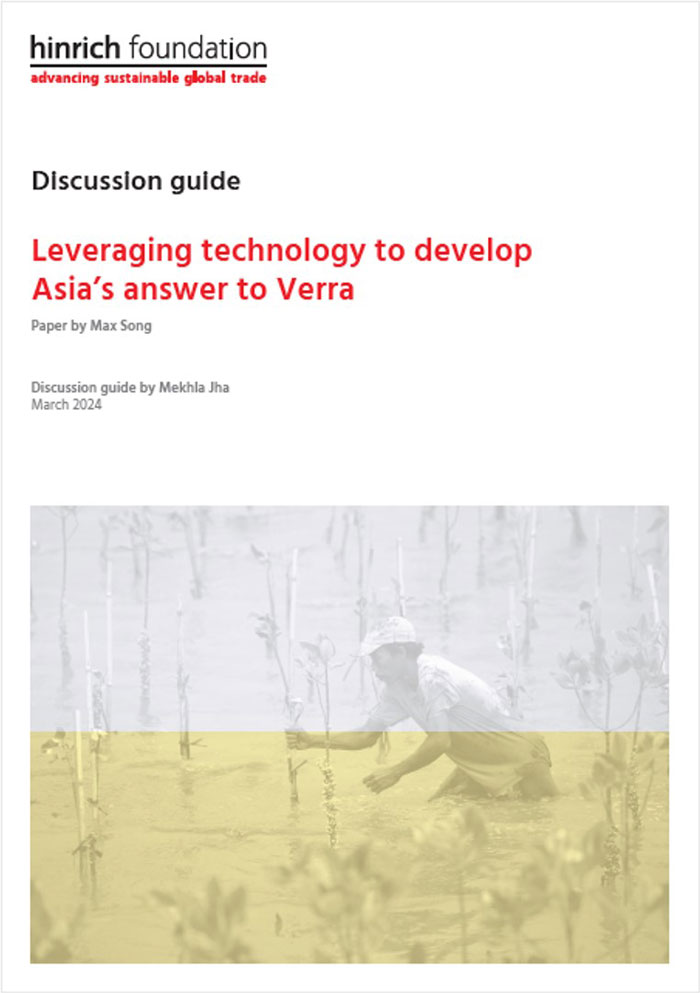
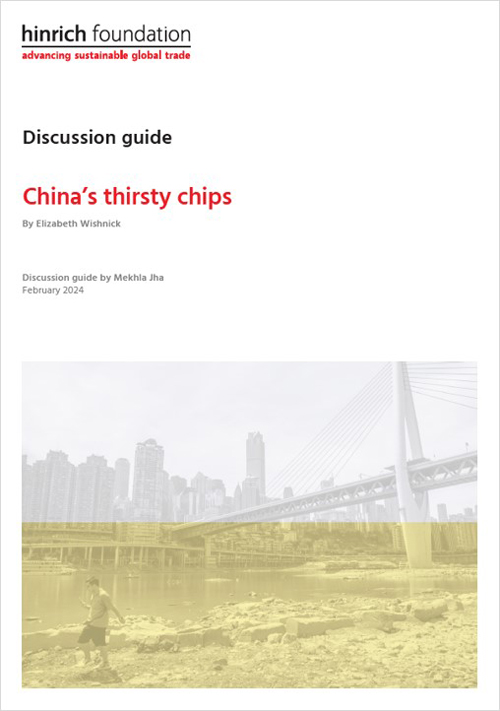
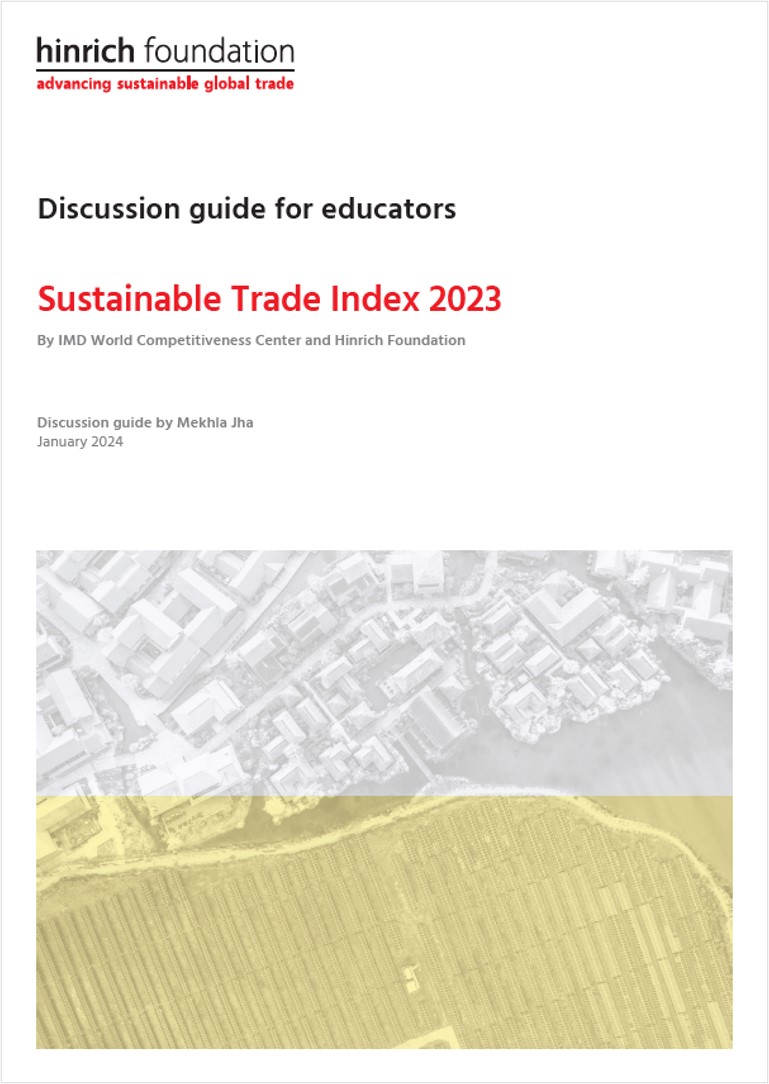
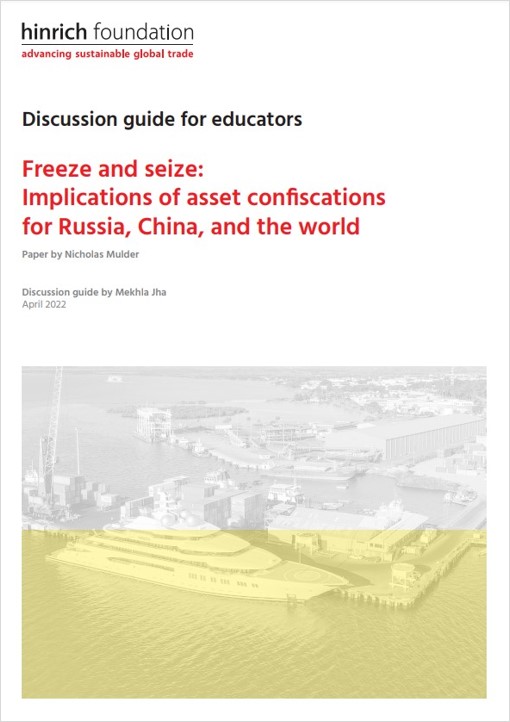
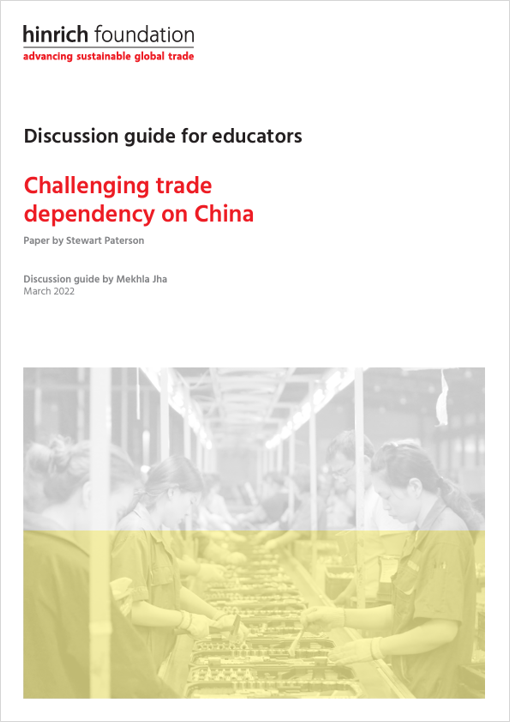
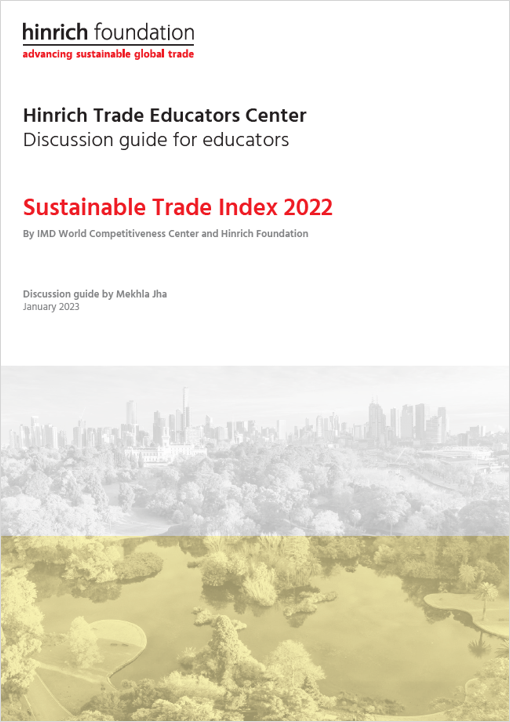

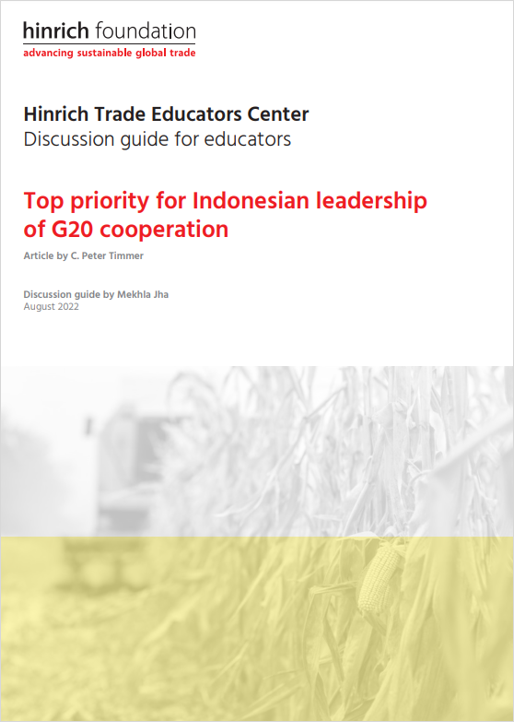
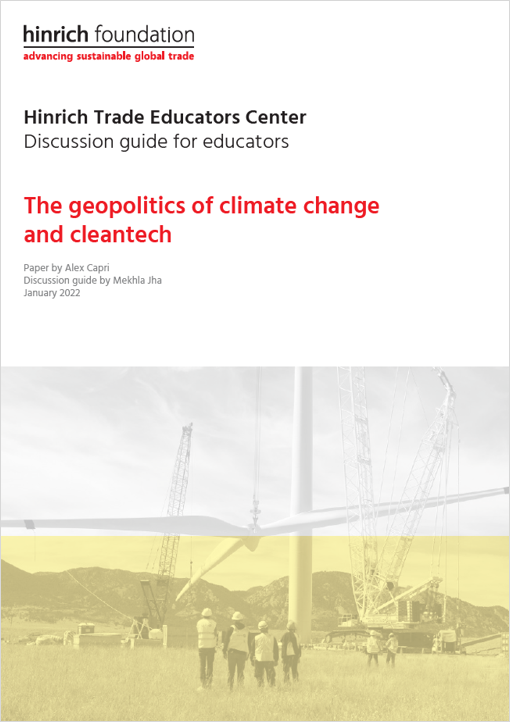
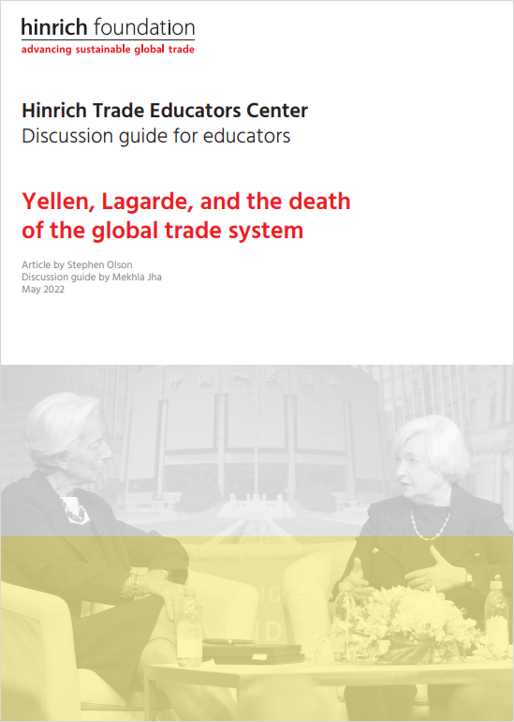
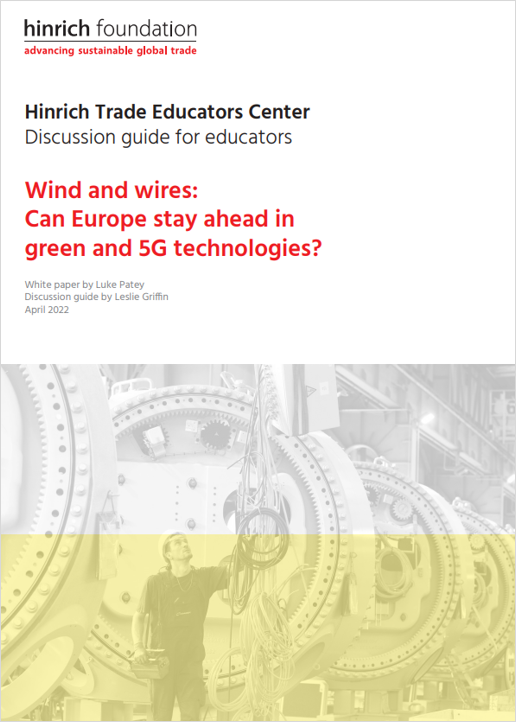
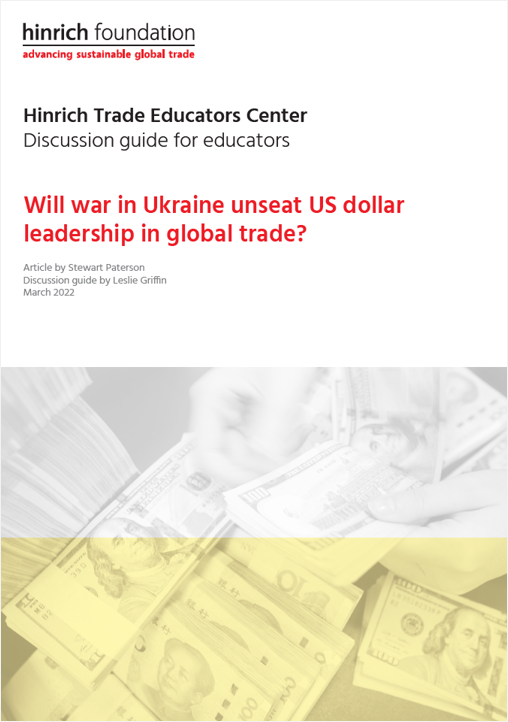
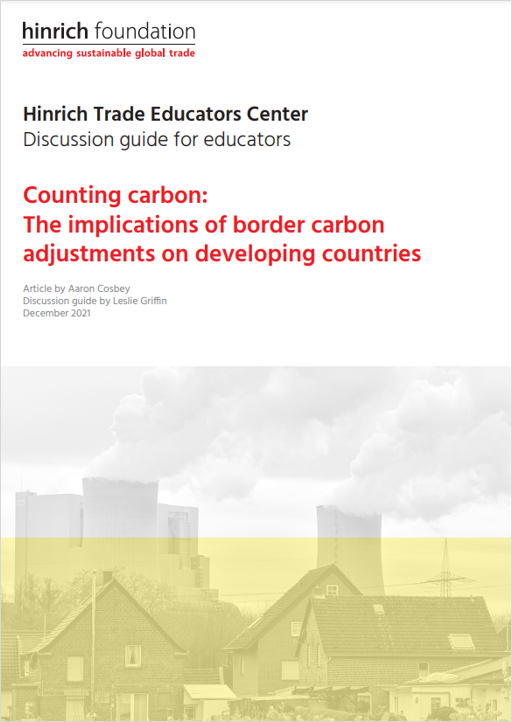
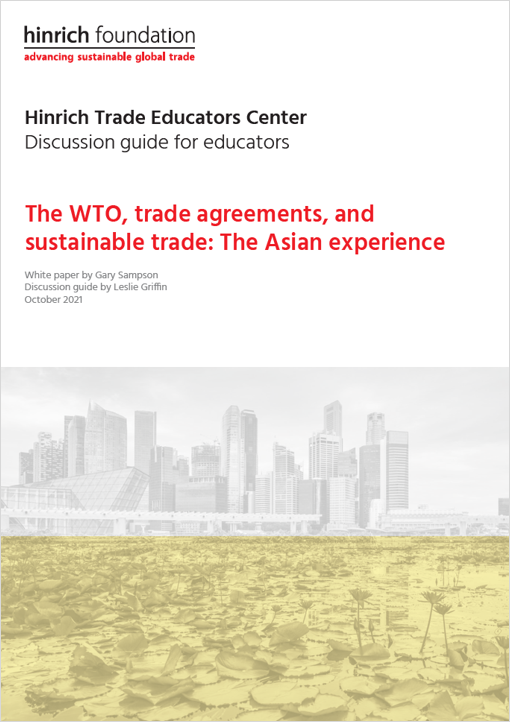
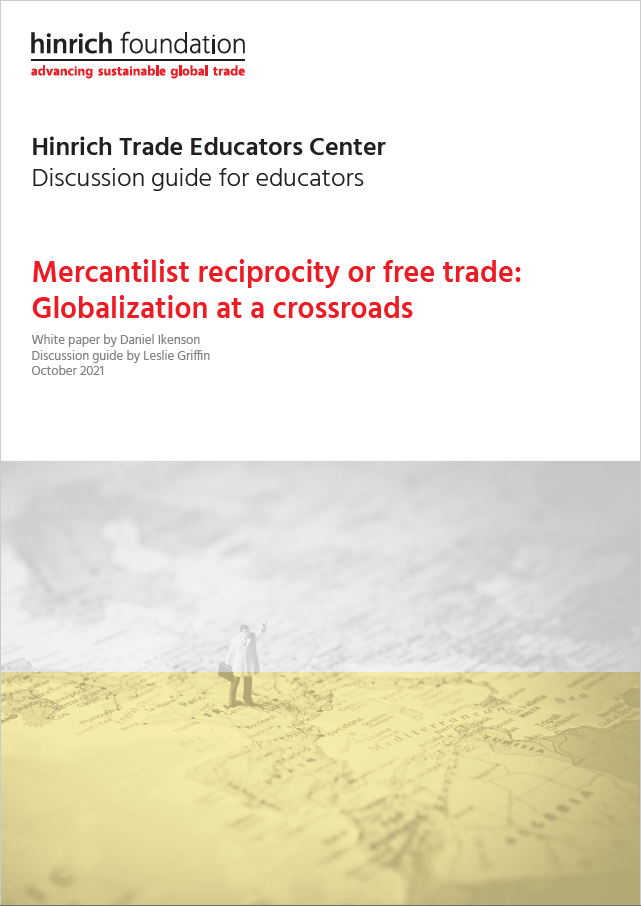
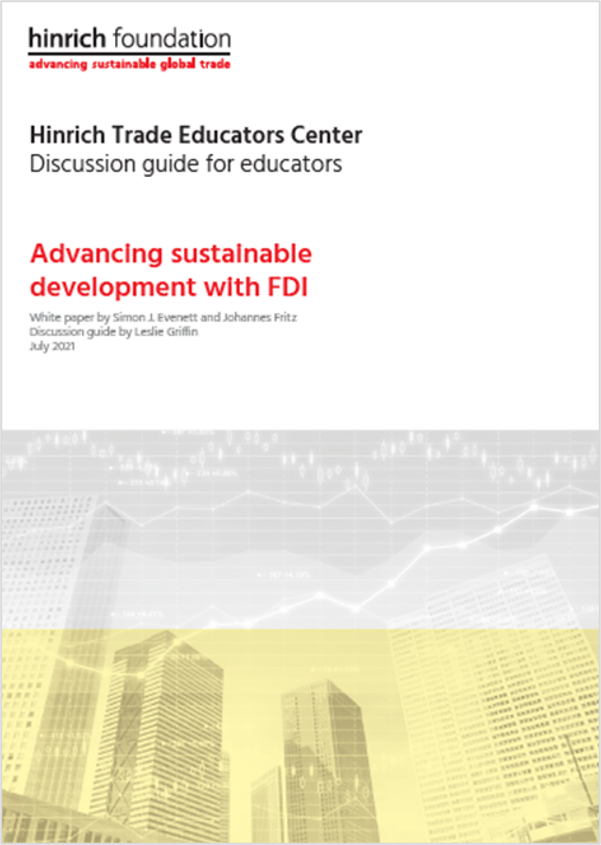
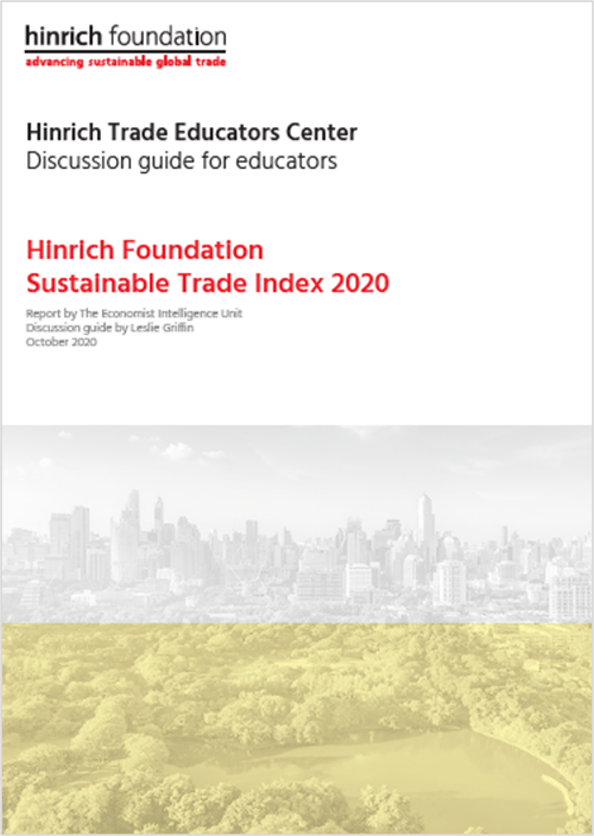





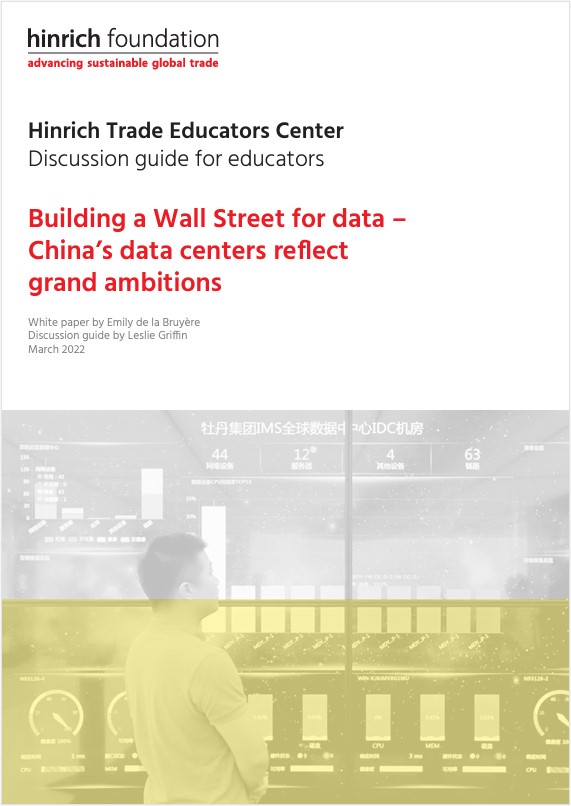
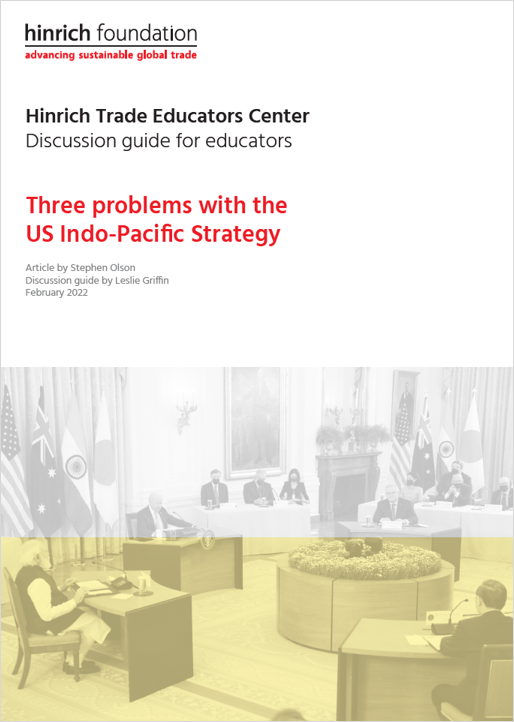
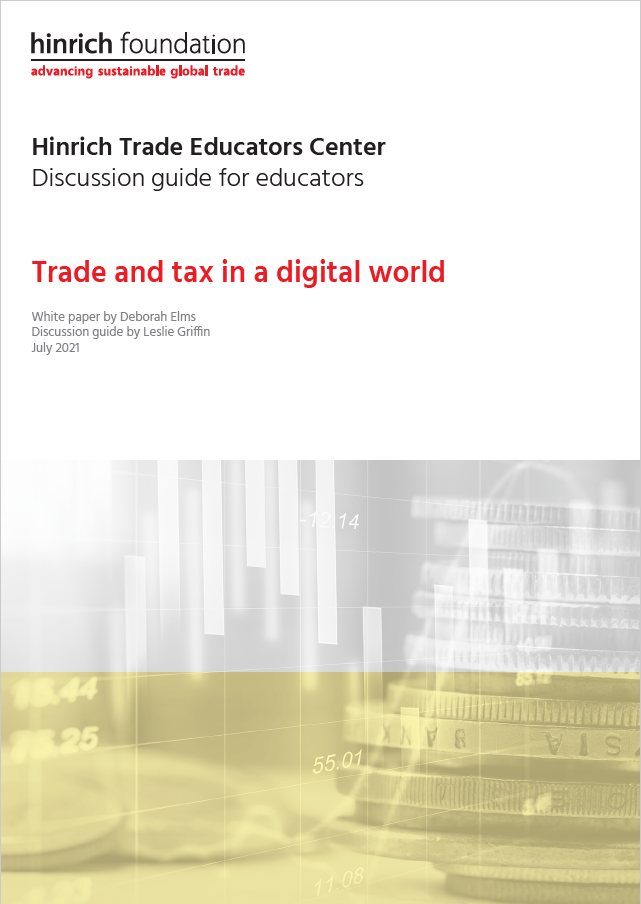
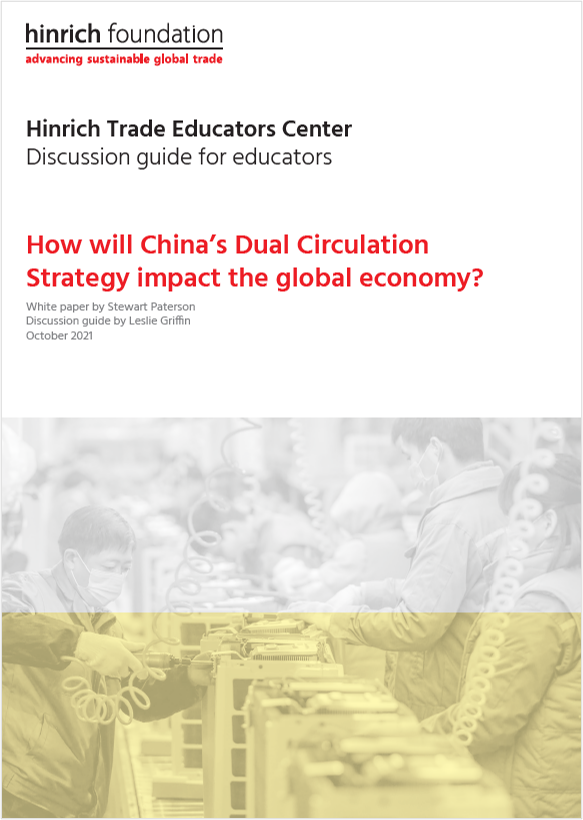
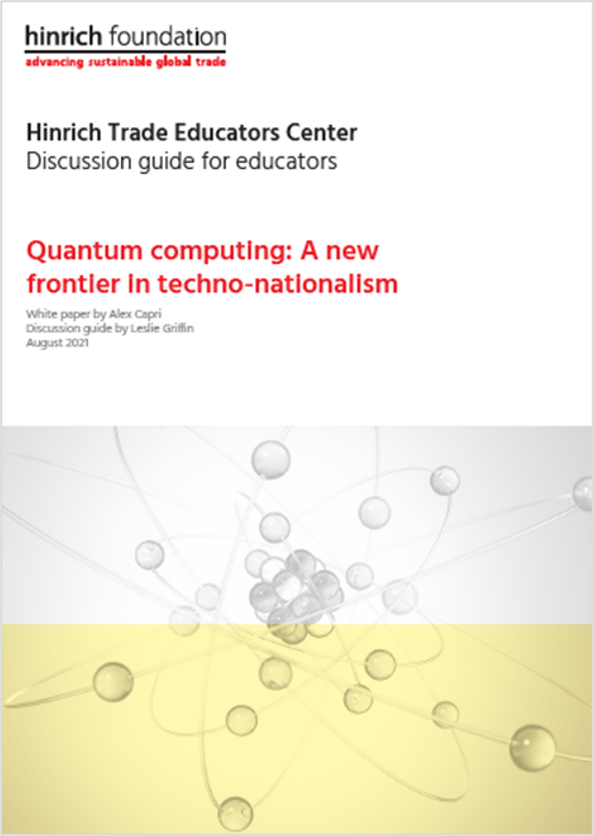

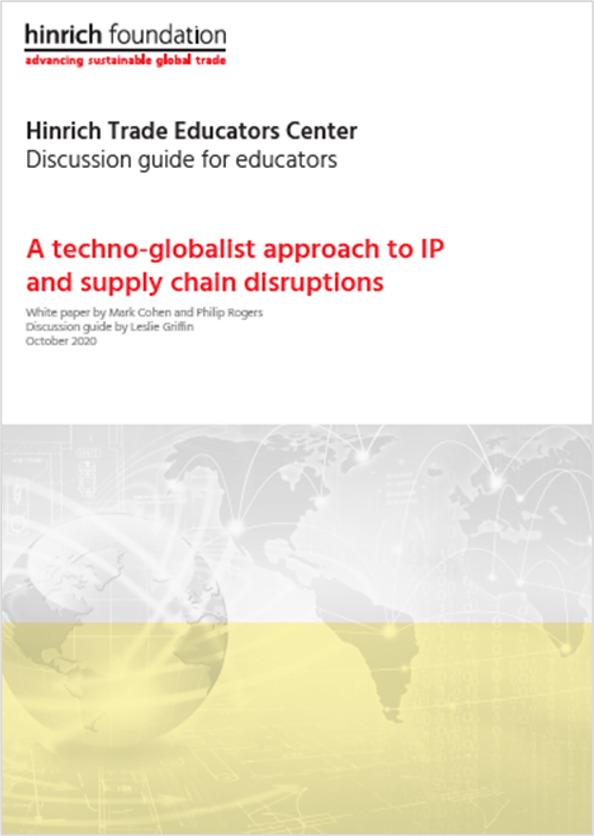
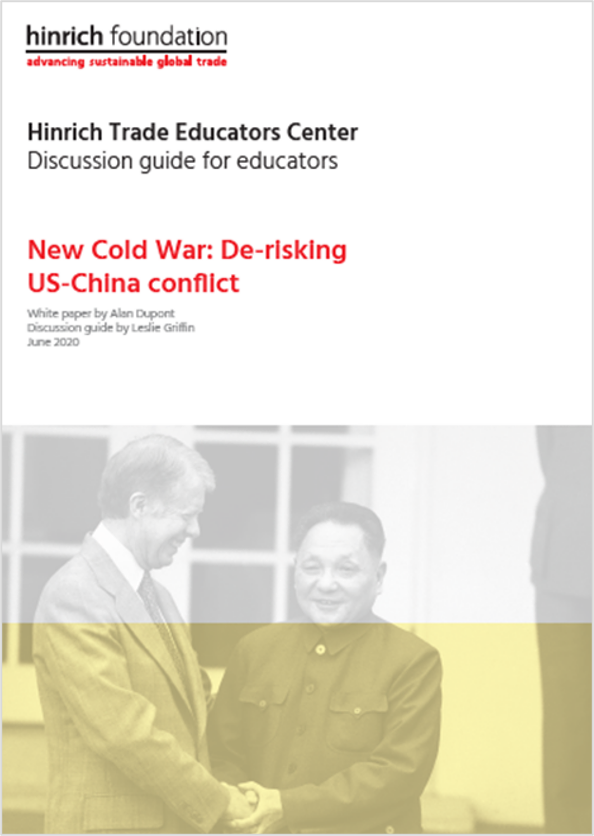
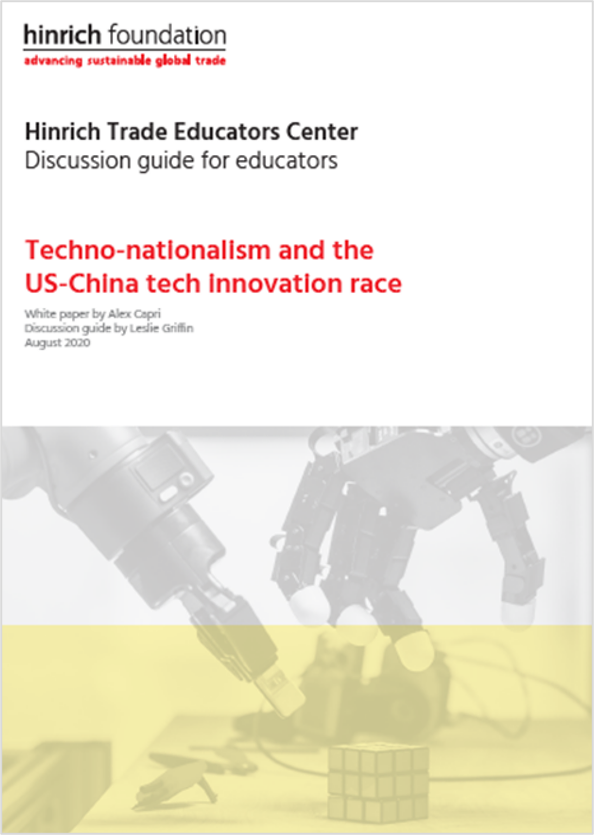
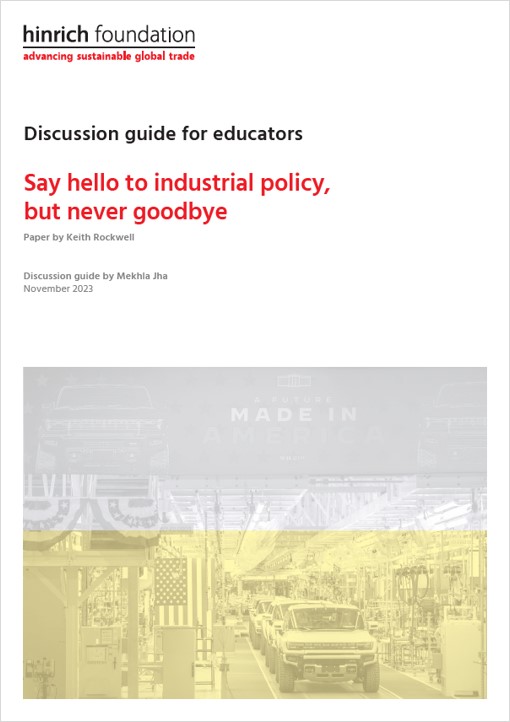
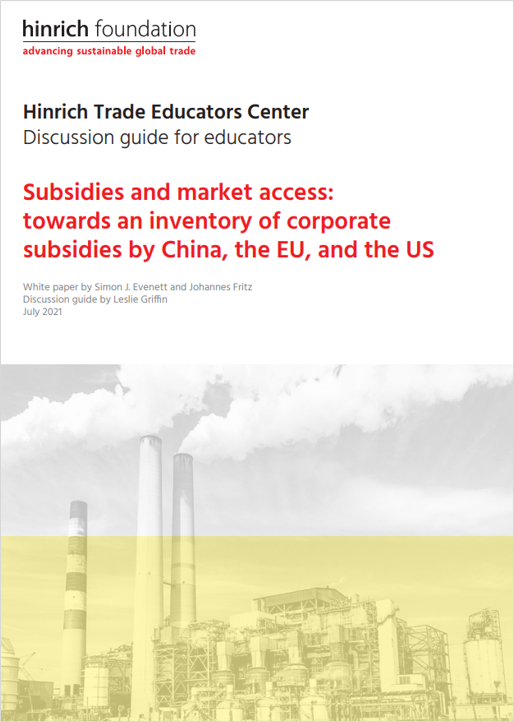
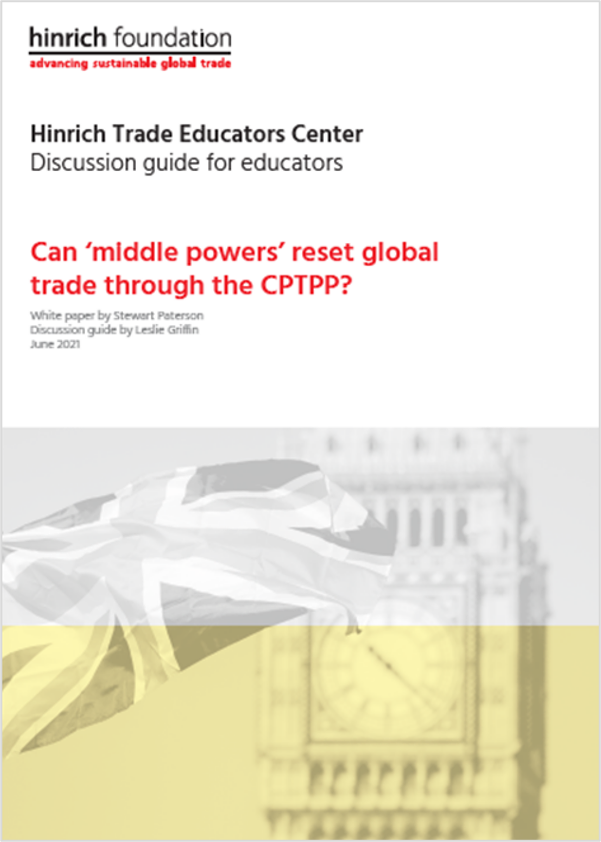


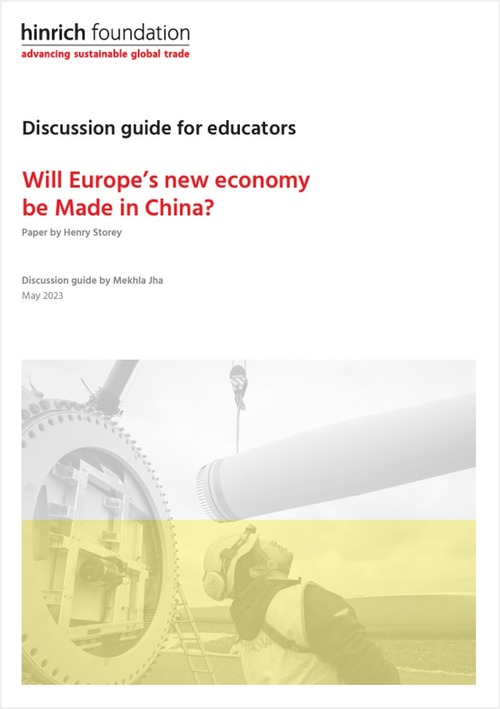
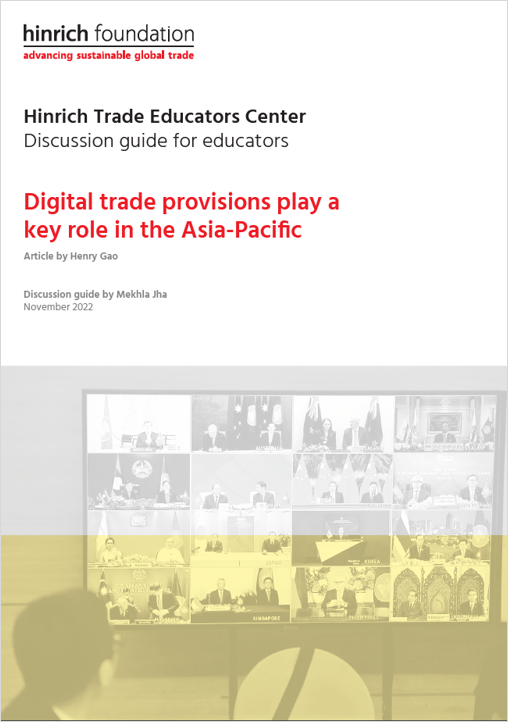
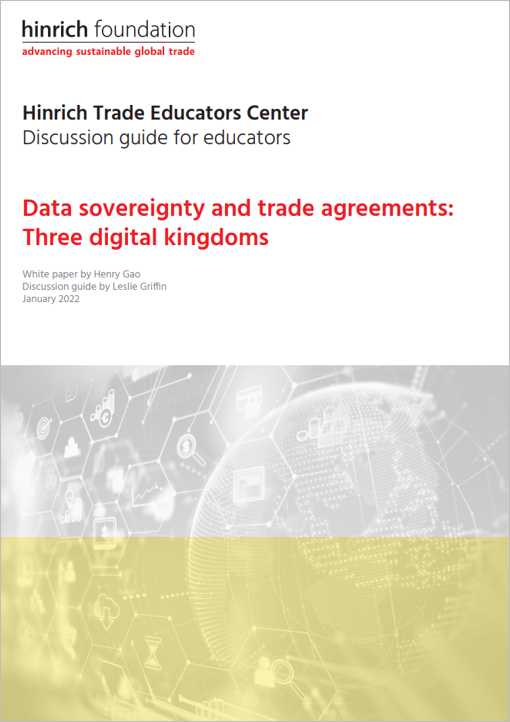
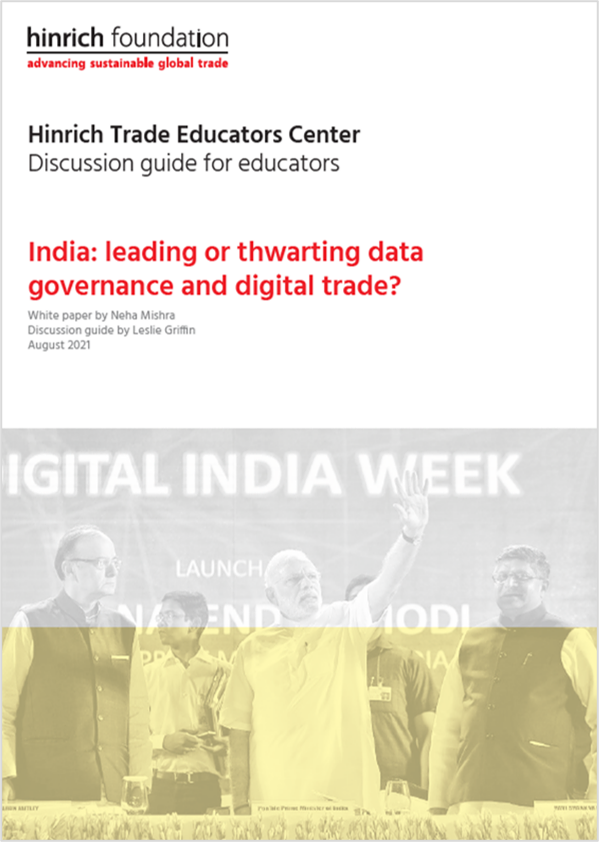
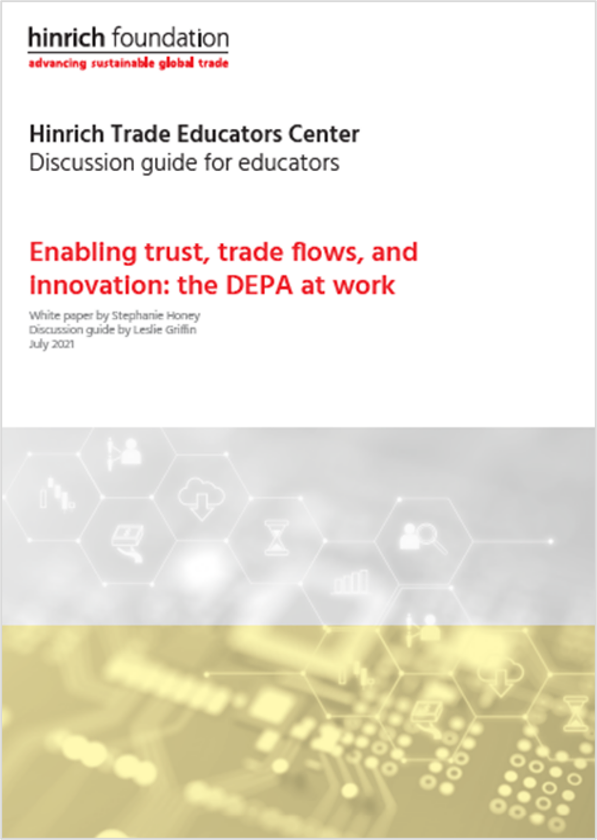
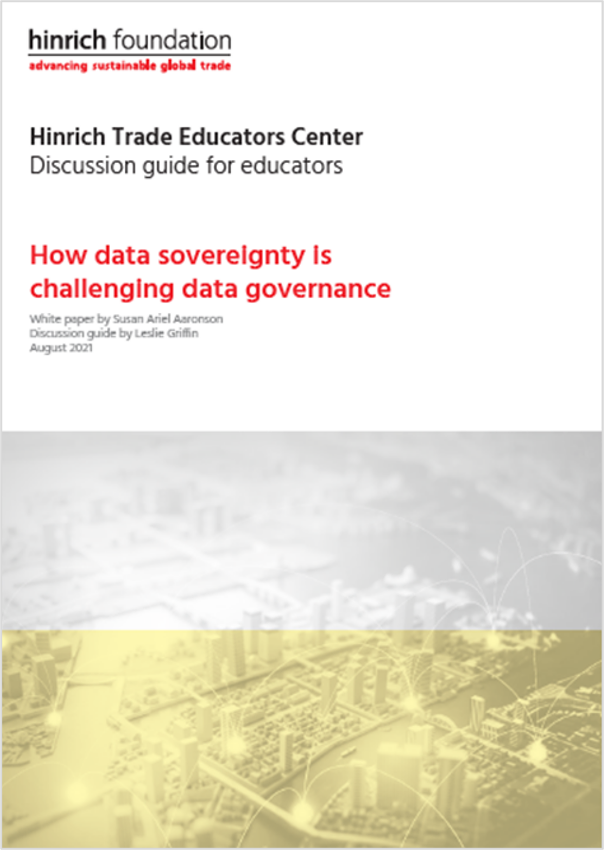
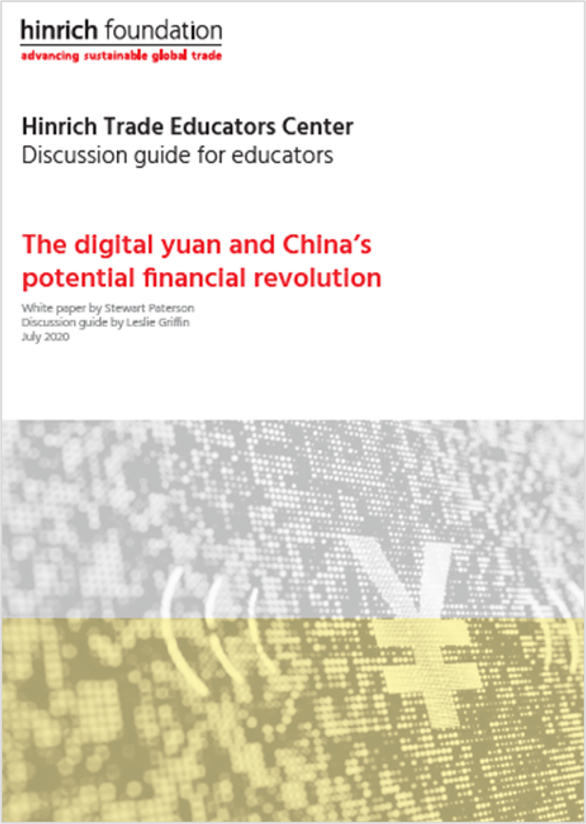
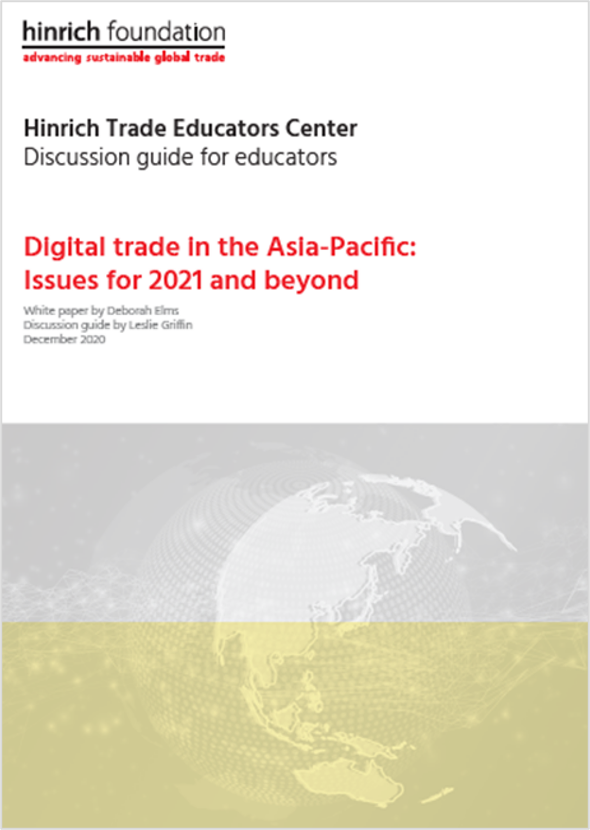
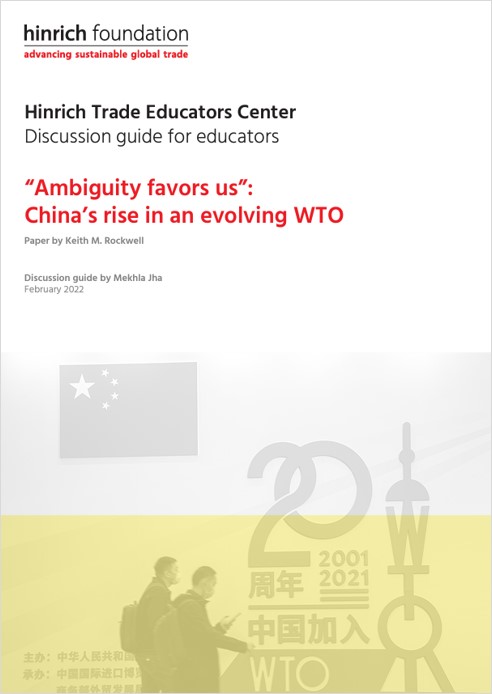

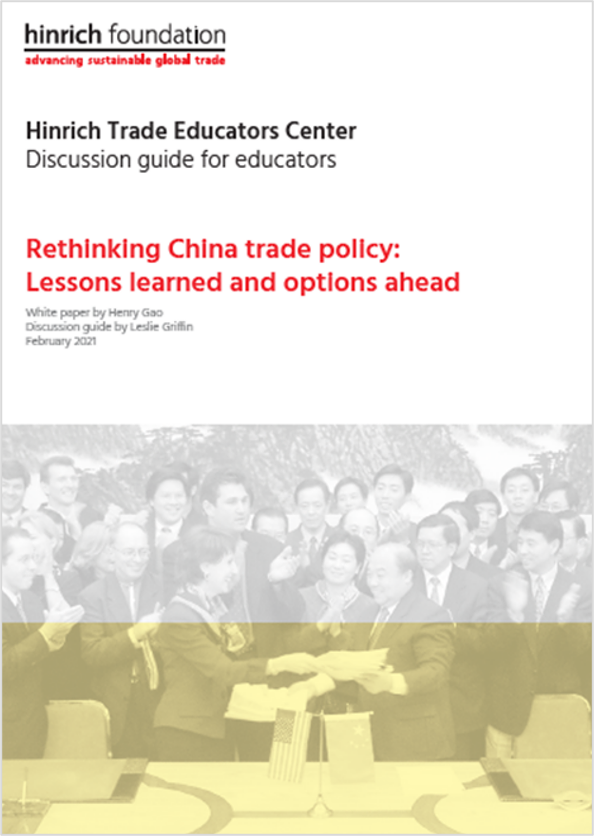
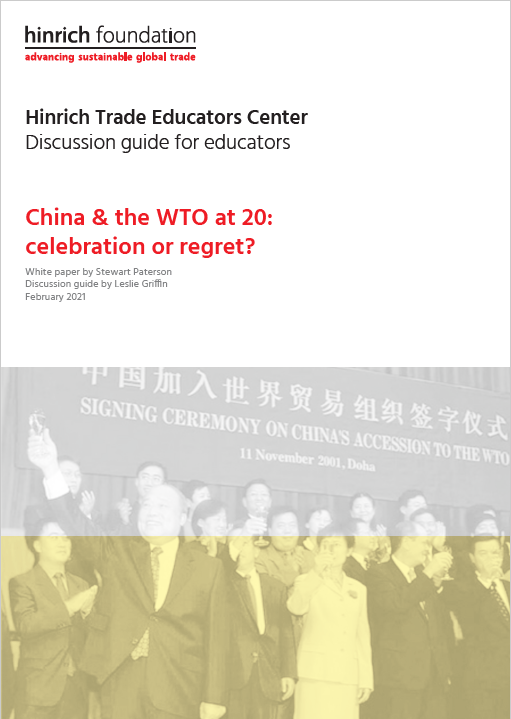
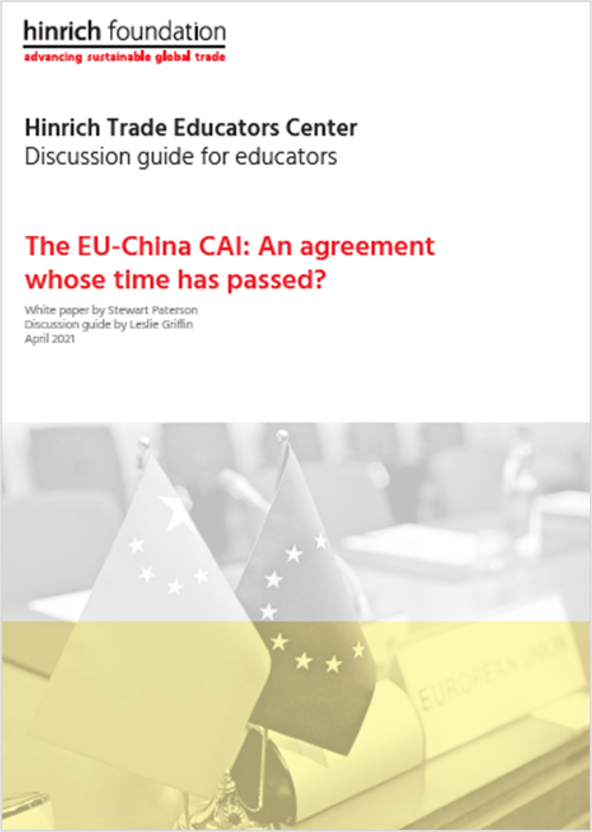
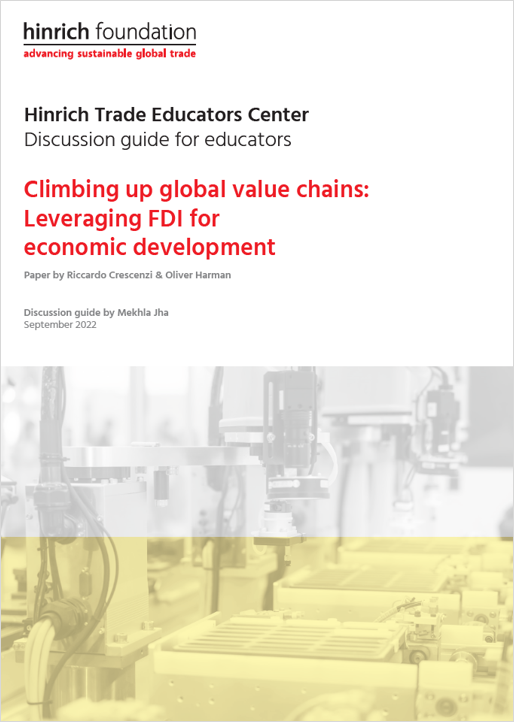
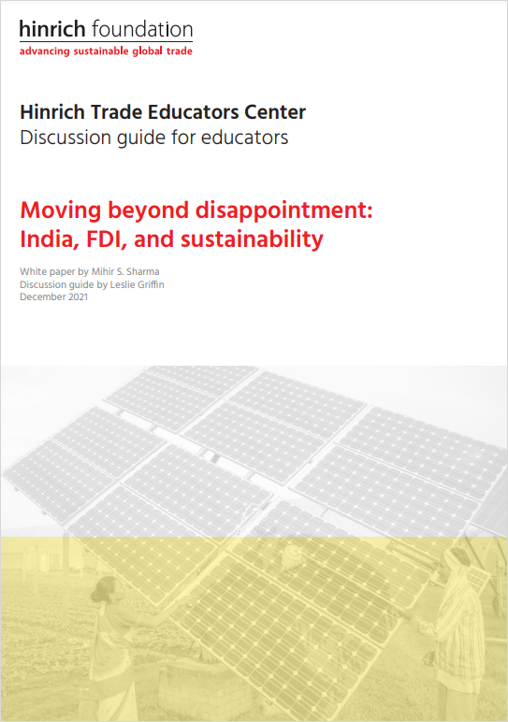
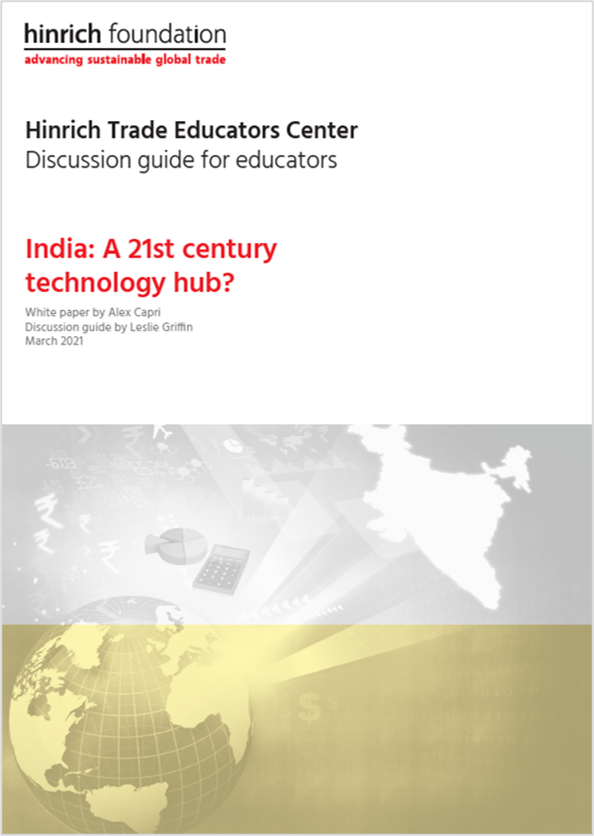
![[Discussion Guide] Is Geopolitics Now The Overriding Determinant In Global Trade Hinrich Foundation Discussion Guide November 2024](/media/xthiex4e/discussion-guide-is-geopolitics-now-the-overriding-determinant-in-global-trade-hinrich-foundation-discussion-guide-november-2024-1.jpg?mode=crop&width=317&height=448)

